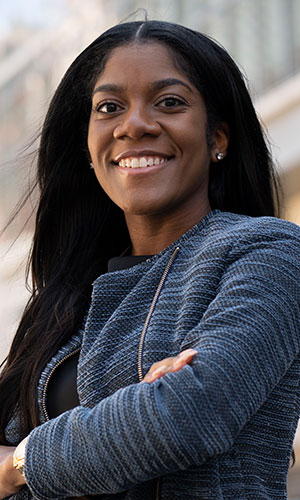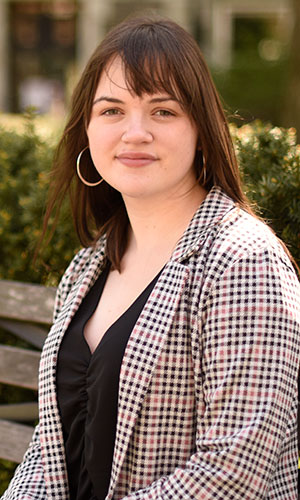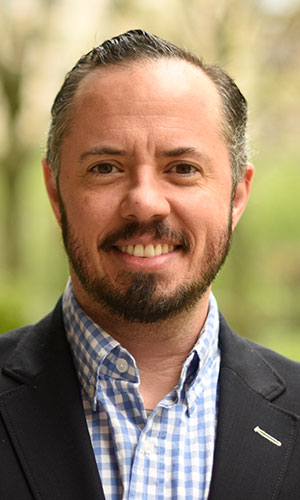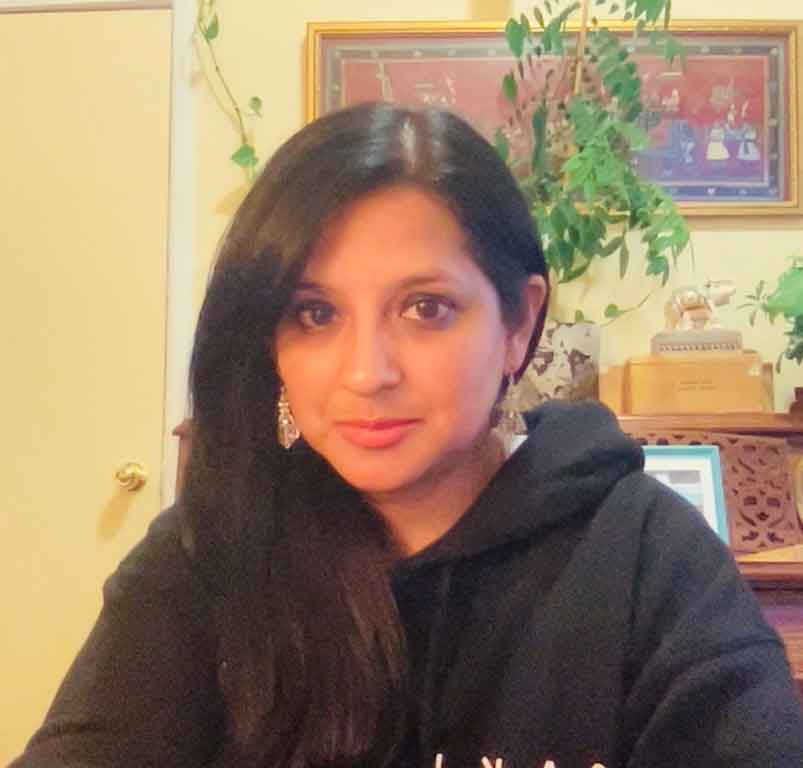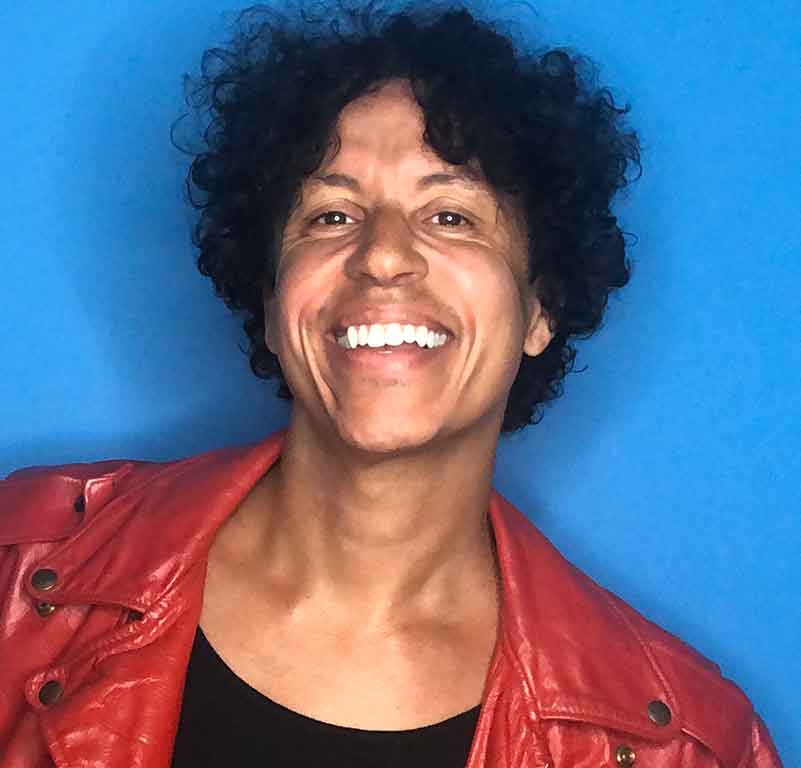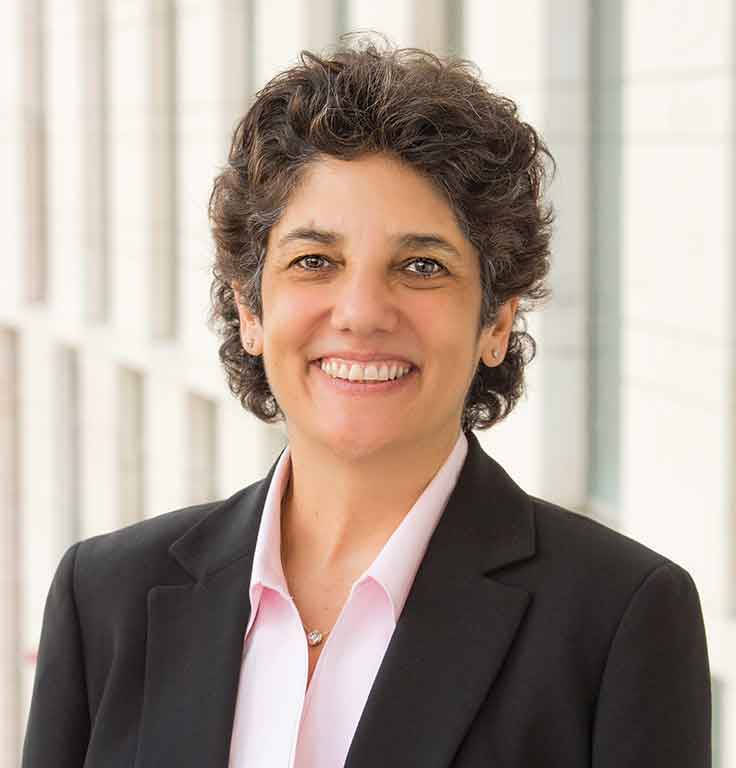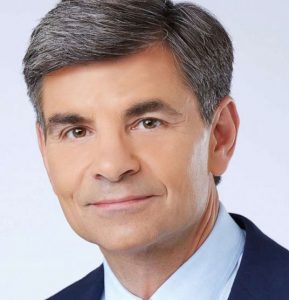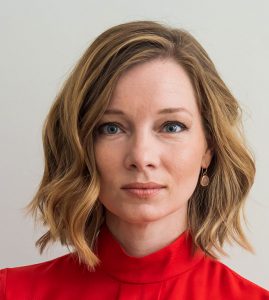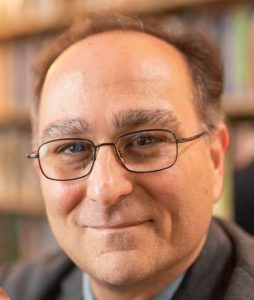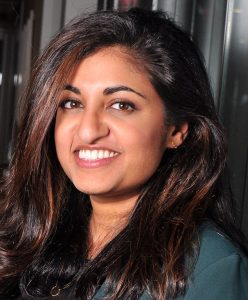Designed for working professionals, the 30-credit degree will give students the scientific knowledge and technical skills needed to succeed in a growing field where groundbreaking developments such as gene editing and personalized medicine are advancing at a rapid pace.
The degree can be completed in one year and offers three tracks: The first, Business and Law/Regulatory, will start in January. Two others, Biochemical/Biomolecular Technologies, and Data Analytics/Informatics, will be open for enrollment in September 2025. A fourth, generalized track that allows students to personalize their interests will also be open in September.
Biotechnology Is a Growing Field
Falguni Sen, Ph.D., head of Fordham’s Global Healthcare Innovation Management Center, said hiring in the field of biotechnology is expected to increase.
“We see the potential for major growth taking place broadly in the life sciences areas, which includes biotechnology,” said Sen, who oversees the program.
Statistics paint an encouraging picture of the field. According to IBIS World Industry Reports, the market size of the U.S. biotechnology industry grew 7.7% per year on average between 2018 and 2023.
The industry, which combines engineering and natural sciences to create commercially viable therapeutics, is also important to New York City’s economy. In December, Mayor Eric Adams signed legislation offering tax incentives for growing biotech companies to create jobs in the city. According to the city’s Economic Development Corporation, an estimated 16,000 new jobs are expected to be created in the field by 2026.
What Can You Do with a Biotechnology Degree?
Sen said the specialization tracks were specifically tailored to the areas of the field where there are opportunities. A student who recently graduated with a bachelor’s degree in biology and aspires to be a scientist or scientist’s assistant would benefit from the Biochemical/Biomolecular Technologies concentration. Someone who is already working in the industry and wants to include a focus on AI, on the other hand, might be drawn to the Data Analytics/Informatics specialization.
“The informatics track allows you to become a specialist in the analytics side, but you’re not just a run-of-the-mill analytics person. You’ll be an analytics person who knows the biotech industry. That gives you a leg up,” said Sen.
Sen noted that because biotechnology is a fertile area for startup businesses, the Business and Law/Regulatory track was designed for anyone who is working in the industry and wants to strike off on their own.
“They might have a Ph.D. already, but they have an idea and really want to be an entrepreneur. They need to know what the regulatory system is, how to get venture money, how to do all of that,” he said.
Other fields graduates will be equipped for include finance, government, compliance, and biopharma.
Practical Biotech Degree Offers Flexibility and Hybrid Learning
Classes are a hybrid of in-person instruction and online learning, with flexible schedules designed for working professionals.
Several new courses, such as AI in Biotech, Marketing in Biotech, and Strategic Entrepreneurship and Business Development, have been created specifically for the degree.
“What’s wonderful about this degree is that there is a core of five courses that really give you a sense of how this industry is structured, how it makes money, what its peculiarities are, and all the possibilities that are out there,” said Sen.
“You can take all of this knowledge and harness it for whatever direction you want to take.”
The program is being offered through the Graduate School of Arts and Sciences (GSAS) and leverages the expertise of faculty from the GSAS, the Gabelli School of Business, and Fordham Law.
]]>Landau will be formally installed in his new role in a ceremony on Sept. 12. Fordham Now sat down with him to discuss his vision for Fordham Law.
You taught at Fordham Law for many years and won the school’s Teacher of the Year Award twice. What did you enjoy about teaching, and how will it inform your role as dean?
Teaching has always been a highlight of my career. There’s something truly special about witnessing students tackle complex legal questions and watching them grasp new ideas. It’s a privilege to dive into the legal subjects I enjoyed most as a practicing attorney and see them come alive in new ways in the classroom. And Fordham students are amazing. They come to class prepared and ready to engage.
In your opening message to the Fordham community, you said that Fordham Law is well-positioned to address the “major challenges of our time,” including the polarization placing strains on our legal and political institutions. With a presidential election coming up, that polarization is likely to reach a fever pitch. How can Fordham Law address this challenge?
Fordham is committed to an environment in which students engage with diverse perspectives and develop the skills to counsel clients from all walks of life. Our graduates possess a unique ability to listen attentively, speak with clarity, and bridge divides. We are also unique for our community of trust—a place where people have respect for differing viewpoints and extend grace to those with whom they might disagree. When challenges arise, we get to lean into that communal fabric, and it makes a big difference.
You’ve spent your career working on behalf of marginalized communities, from recent immigrants to LGBTQ+ Americans. How will you continue this work as dean?
Fordham Law has a proud tradition of being a school of opportunity, opening doors for those who face barriers to a legal education. We are a place where students from diverse backgrounds come together, and we see ourselves as a positive force for change. This aspect of Fordham’s identity resonates very strongly with my work in social and legal movements, uniting people around common causes while driving change. I’m committed to continuing this work at Fordham, and I’m excited about it. We have always been—and will continue to be—a law school that promotes an education that brings out the best in everyone so that the broadest range of students can access the transformative power of legal education.
In an article you co-wrote with your predecessor, Dean Matthew Diller, you said that law schools must educate students about new technology emerging in the legal field, including virtual litigation tools, remote networking, and artificial intelligence. What steps should law schools be taking to ensure future lawyers use these technologies effectively and ethically?
The pace of technological change has been astounding, and not just in areas like AI. Law schools must stay ahead by equipping students not only to understand these tools but also to be leaders in shaping their future. Fordham Law School is positioning itself at the epicenter of law and technology. This means hosting conferences where the most important discussions on technology and the law take place, creating tech-focused competition teams, and fostering partnerships that expose students to real-world tech-driven legal problems. Our students engage with pressing issues such as AI and its intersection with ethics, bias, privacy, and both domestic and global regulation—preparing them for leadership in a rapidly evolving legal landscape.
You have said that Fordham Law operates “more fluidly across the theory-practice divide” than any other law school in the world. Can you explain what that means and why it makes you proud?
Some law schools focus heavily on abstract legal theory, while others train students solely for specific events like the bar exam. At Fordham, we excel at finding the ideal balance between those two approaches. Our students graduate with both a deep understanding of legal principles and the skills to apply them in real-world contexts—whether in private practice, government, or public service, and our alumni do some of the most important and sophisticated work across the legal field. This dual focus on both academic excellence and professional preparedness also defines our extracurricular offerings, competitions, and professionalism training. It’s what makes Fordham Law unique and why our alumni are so successful throughout the profession.
]]>

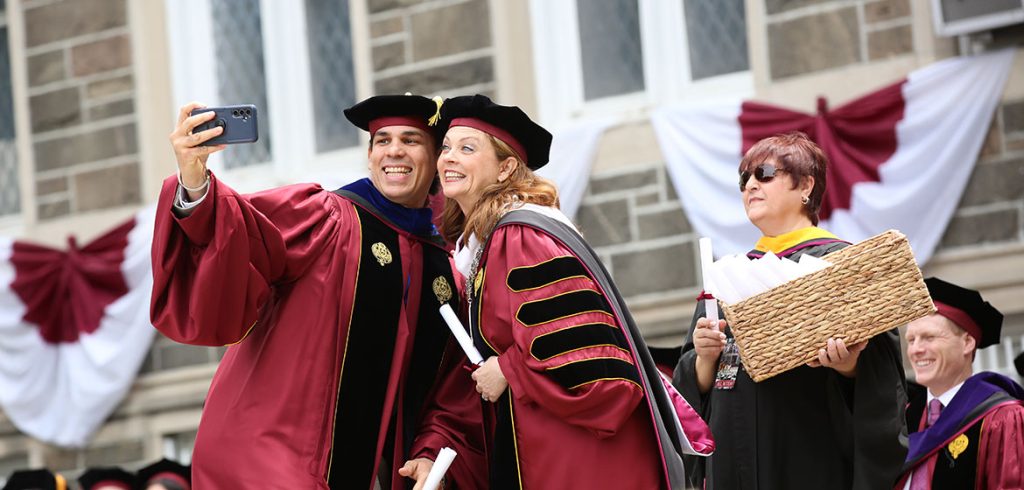
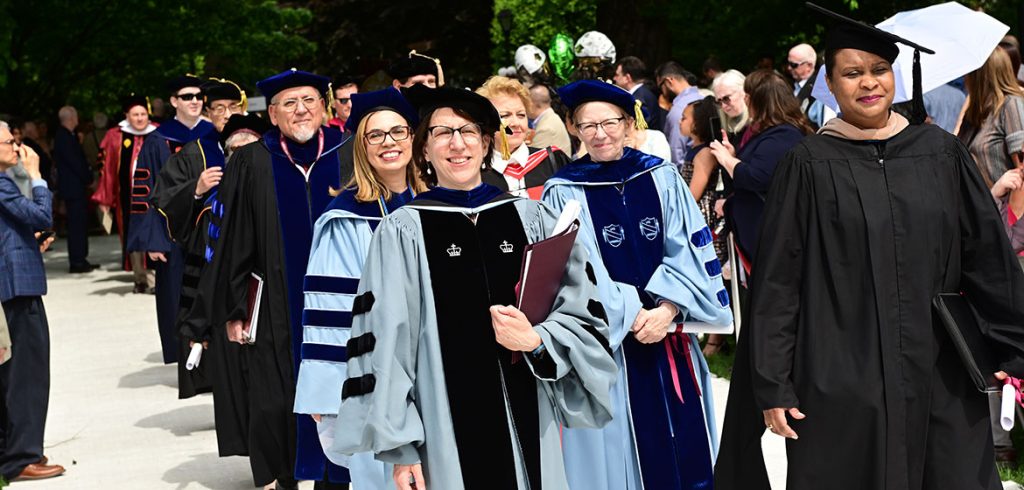
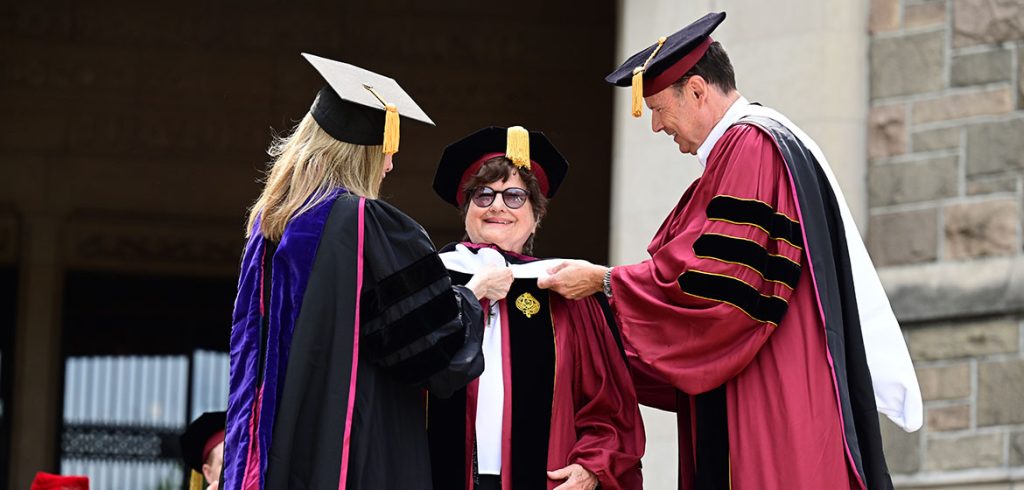

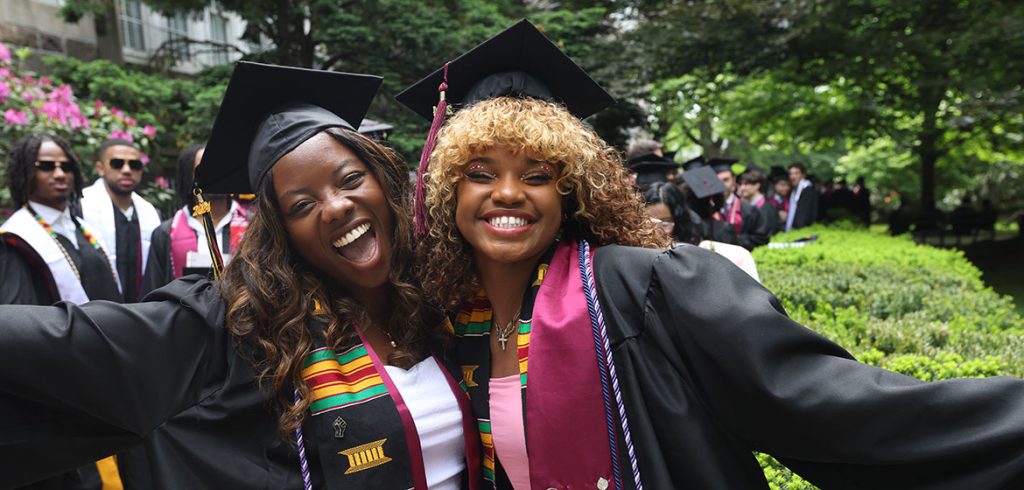
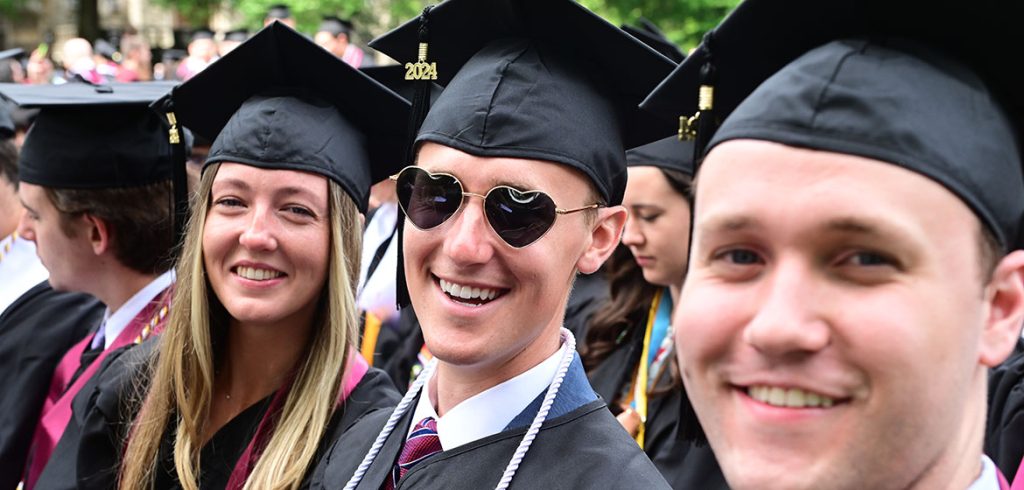


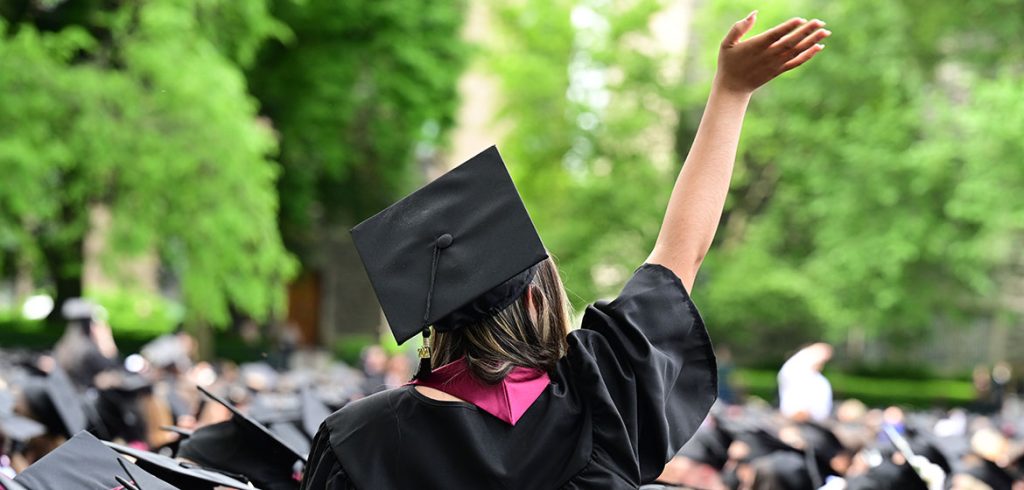

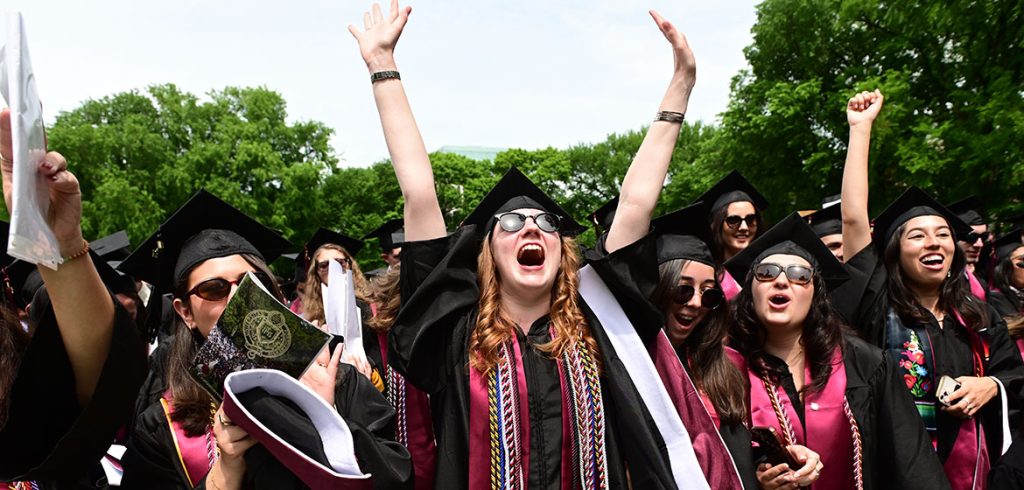
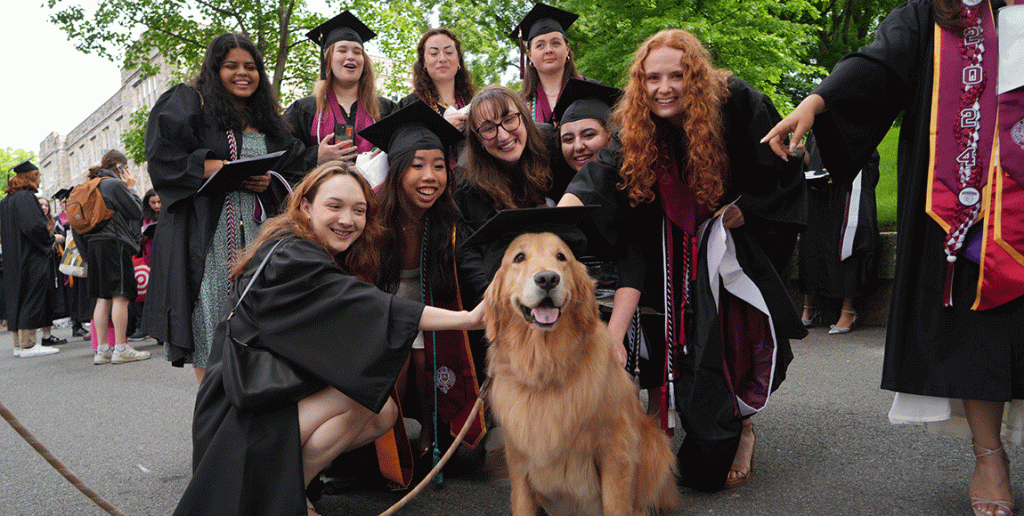
Our fates are united, Joseph Patrick Kennedy III told the Fordham Class of 2024, and peace is possible when we recognize that “our pathway forward is together.”
Speaking at Fordham’s 179th Commencement on May 18, the U.S. Special Envoy to Northern Ireland for Economic Affairs recalled that region’s painful history—and eventual peace—to illustrate that even amid longstanding war and division, there is reason for hope.
“While we may come from different backgrounds and perspectives, the lesson Northern Ireland teaches is that our future is shared,” he said from Keating Terrace on the Rose Hill campus, just after receiving an honorary doctorate from the University.
“It is as true in Belfast as in Boston. It is true across our United States. It is true in Israel and Gaza, where terror and heartbreak, violence, and suffering must give way to a shared future. And it is true in every other corner and cranny of our planet.”

A Bostonian who told graduates he loves New York (even if he can’t quite get behind the Yankees), Kennedy is a grandson of the former New York Senator Robert F. Kennedy. He represented the 4th Congressional District of Massachusetts for four terms before assuming his diplomatic role in 2022.
Northern Ireland’s journey from the strife known as the Troubles, which ended in 1998 with the Good Friday Agreement, is proof that change is possible, he told graduates.
“It’s not perfect. Like everything human, it is really messy and really hard. But 26 years later, the region is still at peace,” he said.
As the sun shone through clouds on the crowd of more than 20,000 people, Kennedy shared anecdotes about meeting people in Derry and Belfast who once were enemies but now are working together.
“There is a difference between being guided by the past and being held hostage by it,” he said.
“If we are bold and brave enough, we can learn to make space for each other, even when we disagree on really big things—if not for our benefit, then for those whose futures are yet to be written.”
He told graduates that the world they inherit needs them.
“It is a world that needs your vision and your grace. Your empathy and ambition. Your courage to choose to leave the world a little better than you found it,” he said.
“And please hurry. Your world awaits, and it needs your help.”
A Time to Celebrate
In her second Fordham commencement address, President Tania Tetlow acknowledged that this year’s ceremonies hold special resonance for many students whose high school graduations were disrupted by the COVID pandemic.
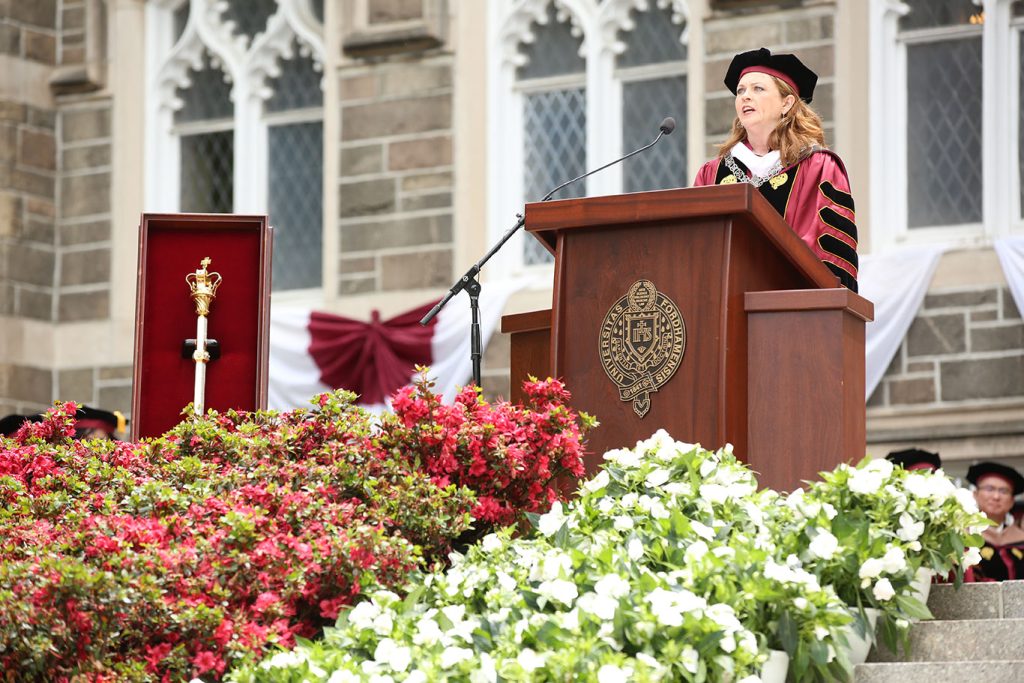
“Today is the day to glory in what you have achieved,” she said, noting that even the Empire State Building will be shining in the graduates’ honor tonight.
In graduating, students joined the ranks of millions of Jesuit-educated people around the world who can bond with each other simply by referencing the phrase cura personalis, or care for the whole person, she said.
“But this isn’t the kind of secret handshake that gets you insider entitlement. Instead, it’s an enormous responsibility that you carry with you forever,” she said.
“You came to Fordham with blazing talent, each of you blessed by abundant gifts from God. But—and this may be a rare thing to say at commencement—those gifts do not make you better than anyone else,” she said.
“What makes you special is how you use your gifts to matter to the world.”
The University officially conferred roughly 3,300 bachelor’s, master’s, and doctoral degrees at the ceremony. Including those who graduated in August 2023 and February 2024 and those who are expected to graduate in August 2024, the University will confer nearly 5,700 academic degrees in all.
In addition to Kennedy, Fordham conferred honorary doctorates upon two other notable figures: Sister Helen Prejean, author of Dead Man Walking and a leading global activist against capital punishment, and the University’s former board chairman Robert D. Daleo.
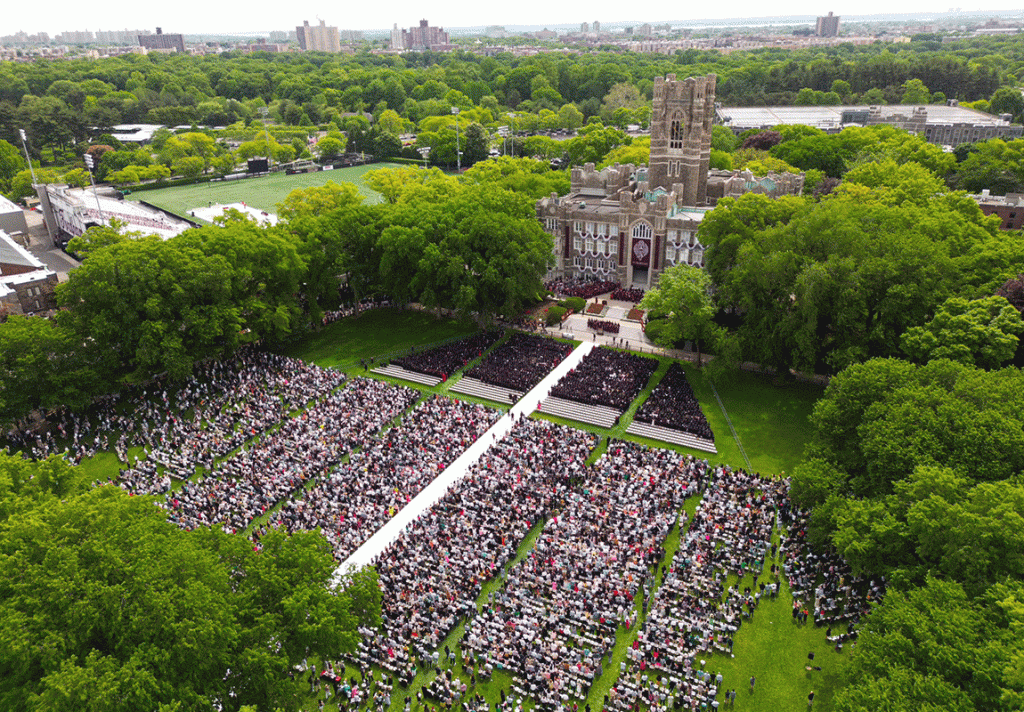
—Photos by Chris Taggart, Bruce Gilbert, Hector Martinez, and Taylor Ha
Watch the full ceremony here.
Answering a call from Pope Francis, Fordham is indeed a place committed to taking “concrete actions in the care of our common home.”
Here are some updates from the first quarter of 2024, from student sustainability interns to “cool” foods to fun community events that make an impact.
Facilities
In January, 11 more undergraduate students joined Fordham’s Office of Facilities Management as sustainability interns to help the University in its efforts to reduce its carbon emissions. They’re working on projects connected to AI-enabled energy systems, non-tree-based substitutes for paper, and composting. The office is still looking for three more students to join; email Vincent Burke at [email protected] for more information.
Dining
Stroll into a dining facility at the Rose Hill or Lincoln Center campus, and you’ll find “Cool Food” dishes such as crispy chicken summer salad, California taco salad, and spicy shrimp and penne.
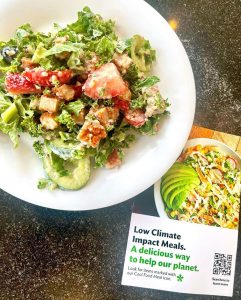
The dishes, which are marked by a distinctive green icon at the serving station, have a higher percentage of vegetables, legumes, and grains, which generally have a lower carbon footprint than those with beef, lamb, and dairy. According to the World Resources Institute—which Fordham partnered with on the Cool Food project—more than one-quarter of the world’s greenhouse emissions come from food production.
In March, the University went one step further by signing onto the New York City Mayor’s Office Plant-Powered Carbon Challenge. The pledge commits Fordham and Aramark to reduce our food-supply carbon emissions by a minimum of 25% by the year 2030.
Academics
This semester, a new one-credit, university-wide experiential learning seminar titled Common Home: Introduction to Sustainability and Environmental Justice was taught by faculty and staff from the Gabelli School, the Center for Community Engaged Learning, the Department of Facilities, the Department of Biology, and the Department of Theology.
Other sustainability-focused courses this semester include the City and Climate Change, the Physics of Climate Change, and You Are What You Eat: the Anthropology of Food (Arts and Sciences); Sustainable Reporting and Sustainable Fashion (Gabelli School of Business); and Energy Law and Climate Change Law and Policy (Law).
Did You Know?
Like most buildings in New York City, the ones on the Rose Hill campus get almost all of their power from power plants fueled by natural gas (along with some solar power). To power a building like Walsh Library, a natural gas-powered plant normally uses 37 million gallons of water annually. But fuel cells like the ones that were installed at the Walsh Library in 2019 actually make their own water, and as as result, Fordham is saving the community the equivalent of 57 Olympic-sized pools each year.
Students Take the Lead
At Fordham Law School, the student-run Environmental Law Review hosted a March 14 symposium that considered the impact of artificial intelligence on environmental law. Panels focused on how regulators and litigators can use AI and the challenge of addressing AI-generated climate misinformation.
In January, Fordham Law student Rachel Arone wrote The EPA Rejected Stricter Regulations for Factory Farm Water Pollution: What This Means, Where Things Stand, and What You Can Do for the Environmental Law Review. And the Law School’s student-faculty-staff collective Climate Law Equity Sustainability Initiative held a series of lunchtime discussions about climate change, law, and policy.
Student groups LC Environmental Club and Fashion for Philanthropy teamed up on March 8 to create reusable tote bags on International Women’s Day. The bags were donated to Womankind, which works with survivors of domestic/sexual violence and trafficking.
The United Student Government Sustainability Committee continues to run the Fordham Flea, a student-run thrift shop that connects students interested in selling old clothes with those looking to buy sustainably. The next flea will take place on April 26 from 11 a.m. to 2 p.m. outside of the McShane Center.
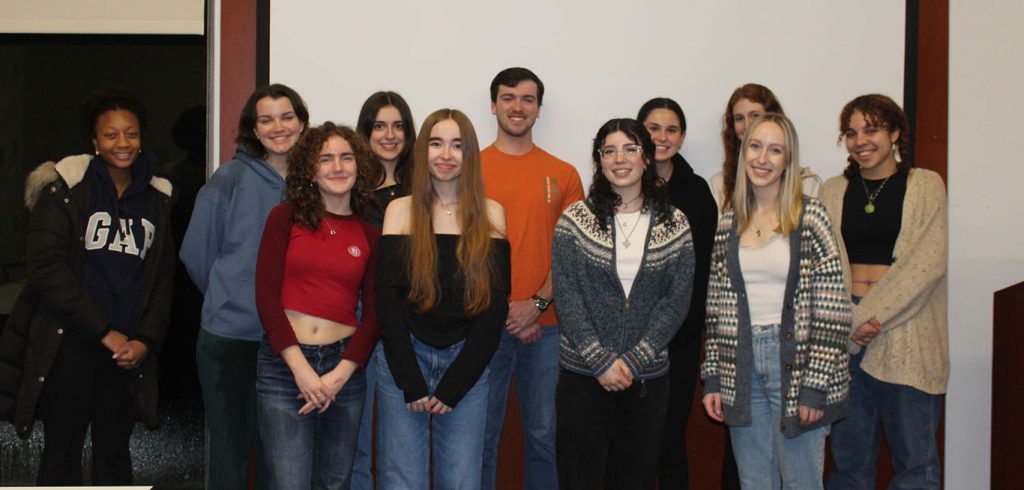
Community Engagement
The Center for Community Engaged Learning (CCEL) held an Urban Agriculture and Food Security Roundtable on Feb. 2. The gathering brought together community organizations and leaders from the Bronx to discuss urban agriculture and food security. Attended by Bronx Congressman Ritchie Torres, the meeting was also an opportunity for groups to learn about resources available from the USDA and the New York City Mayor’s Office on Urban Agriculture.
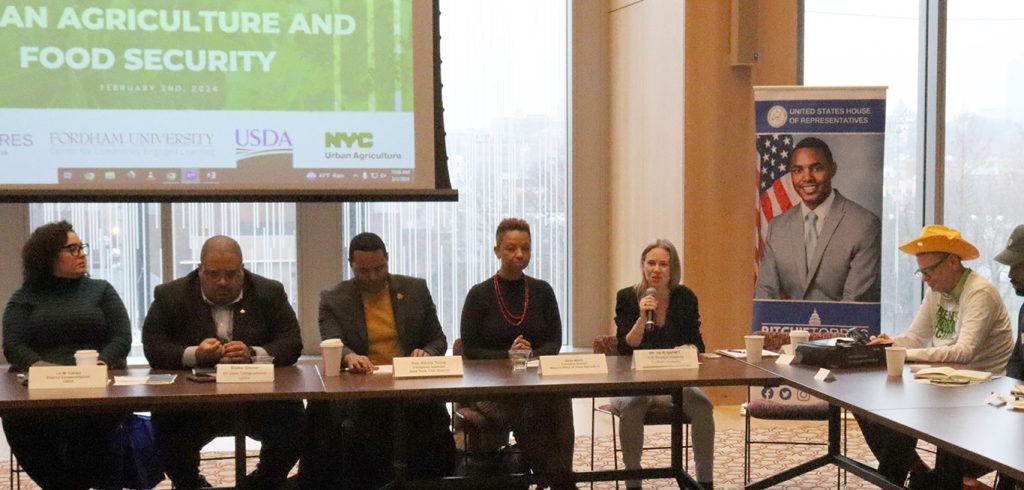
CCEL Director of Campus and Community Engagement Surey Miranda-Alarcon served as a panelist at a March 9 climate justice workshop at SOMOS 2024 in Albany, along with Mirtha Colon, GSS ’98, and Murad Awawdeh, PCS ’19.
Faculty News
David Gibson, director of the Center on Religion and Culture, and Julie Gafney, Ph.D., director of the Center for Community Engaged Learning, attended “Laudato Si’: Protecting Our Common Home, Building Our Common Church” conference at the University of San Diego on Feb. 22 and 23.
Marc Conte, Ph.D., professor of economics, and Steve Holler, Ph.D., associate professor of physics, presented their research around air quality, STEM education, and education outcomes on March 11 at the first night of Bronx Appreciation Week, which the Fordham Diversity Action Coalition organized.
Alumni
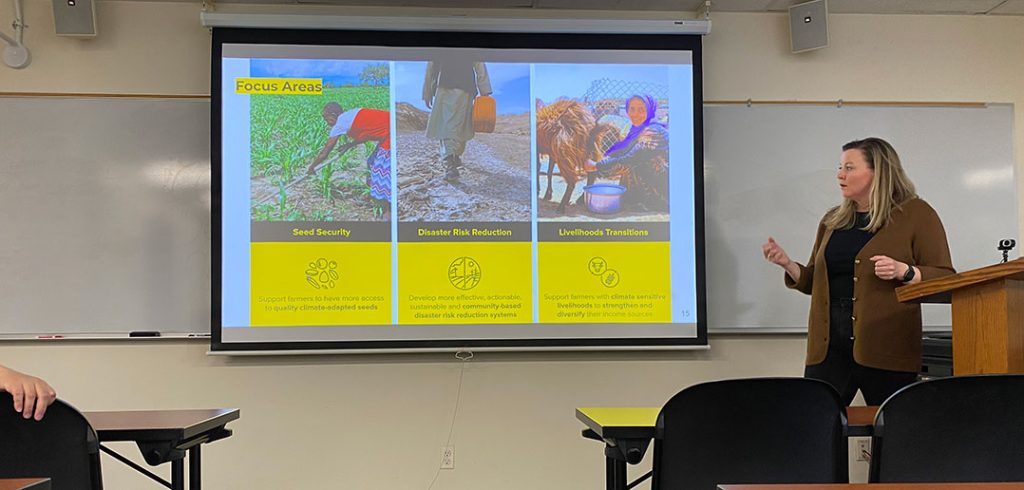
On March 14, Tara Clerkin, GSAS ’13, director of climate research and innovation at the International Rescue Committee, delivered a lecture at the Rose Hill campus titled “The Epicenter of Crisis: Climate and Conflict Driving Humanitarian Need and Displacement.”
In Case You Missed It
Here are some sustainability-related stories that you may have missed: In January, economics professor Marc Conte published the findings of a study that examined whether people living in areas with more air pollution suffer more from the coronavirus. The Gabelli School of Business partnered with Net Impact, a nonprofit organization for students and professionals interested in using business skills in support of social and environmental causes. A group of the Gabelli School Ignite Scholars traveled to the Carolina Textile District in Morgantown, North Carolina, to learn the benefits of sustainable and ethical manufacturing.
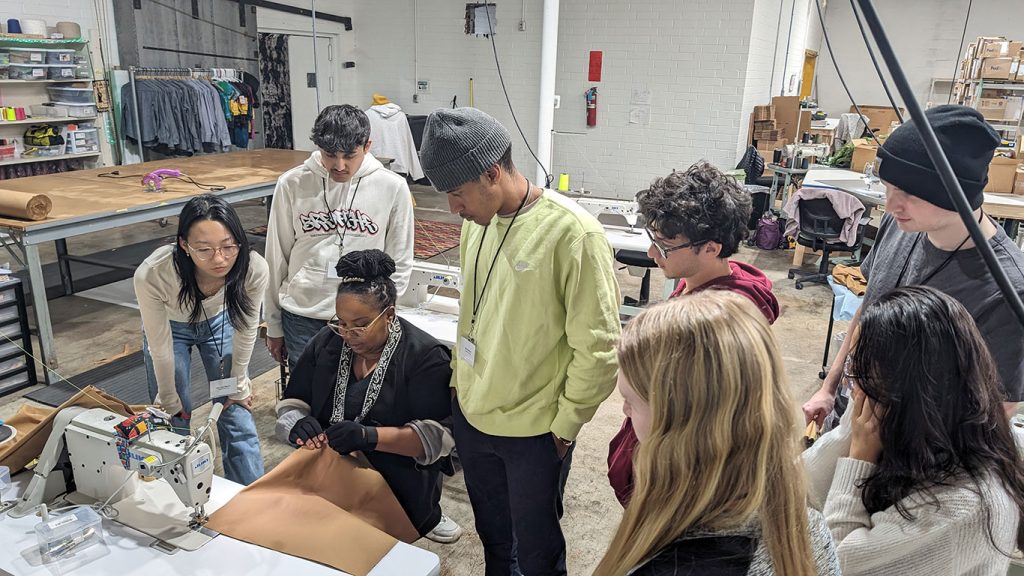
Upcoming Events
April 12 and 19
Poe Park Clean-up
In celebration of Earth Day on April 22, the Center for Community Engaged Learning is organizing visits to the park, where volunteers can help pull weeds and spread mulch. 10 a.m. – 2 p.m., 2640 Grand Concourse, the Bronx. Sign up here.
April 13
Bird Watching in Central Park
Law professor Howard Erichson will lead students on a birdwatching tour of Central Park, where they hope to spot and identify a few of the hundreds of species that pass through Fordham’s backyard on their annual migration routes. Meet at the Law School lobby at 9:30 a.m. Contact [email protected] to reserve a spot.
April 13
Ignatian Day of Service
Students and alumni will meet at the Lincoln Center campus and walk over to nearby Harborview Terrace, where they will build a community garden with residents. Lunch and a conversation about Ignatian leadership will follow. 10 a.m. – 2 p.m.
Click here to RSVP.
April 15
ASHRAE NY Climate Crisis Meeting
The theme of this meeting of the American Society of Heating, Refrigerating, and Air-Conditioning Engineers is “Challenge Accepted: Tackling the Climate Crisis.” All are welcome.
7 a.m.- 1 p.m., Lincoln Center Campus. Contact Nelida LaBate at [email protected] for more information or register here using code FordhamStudent2024.
We’d Love to Hear From You!
Do you have a sustainability-related event, development, or news item you’d like to share? Contact Patrick Verel at [email protected].
]]>The document set forth an ambitious seven-year plan for the University that touches on everything from facilities and curriculum to student involvement, all with the ultimate goal of combating climate change.
Just this month, Fordham received a $50 million grant from the Environmental Protection Agency that the University will use to team up with community partners to address the issue.
Below are a few of the sustainability-related efforts, developments, and accomplishments that took place in the final quarter of 2023. Look for more updates in 2024!
Facilities
Going Hybrid
On Oct. 23, three hybrid minivans, including a wheelchair-accessible minivan, joined the fleet of Fordham’s Ram Vans. They replace gas-powered minivans previously used for wheelchair-accessible requests, trips to the Calder Center, and charter trip services. The vans use less gas, produce less CO₂, and can run up to 560 miles on one tank of gas.
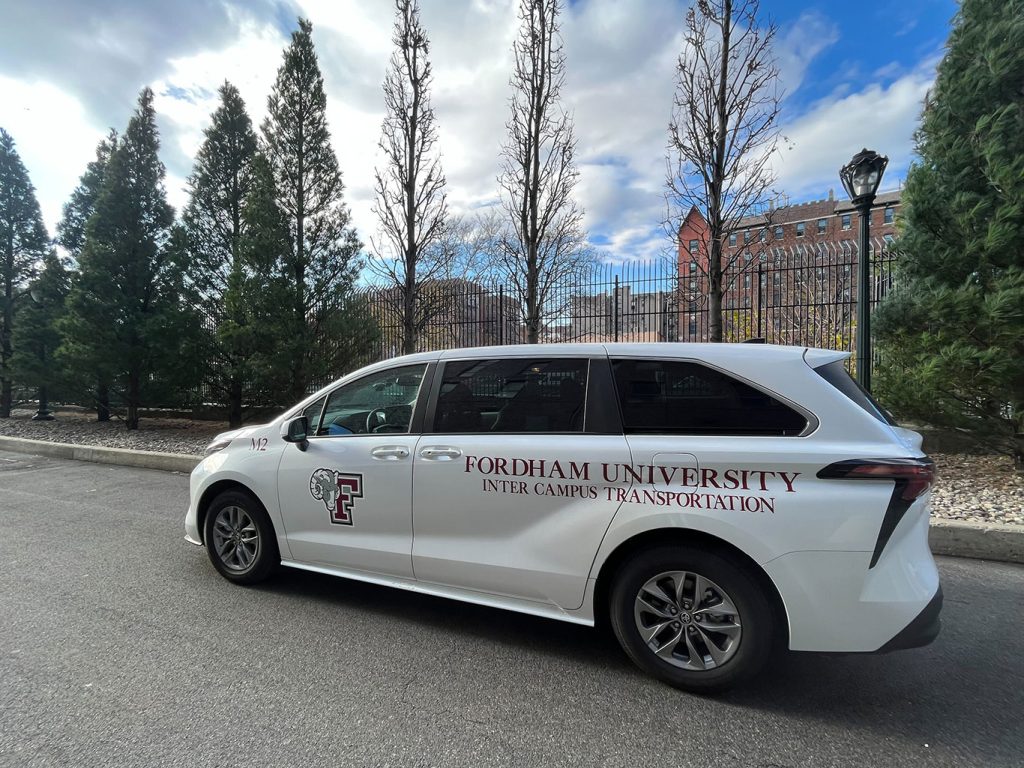
Dining
Micro Farms
This fall, Aramark installed vertical hydroponic units called Babylon Micro Farms at dining halls on the Lincoln Center and Rose Hill campuses. They grow fresh greens and herbs in a water-based solution (instead of soil, which requires frequent watering.) The greens are harvested for use in dining hall dishes and special student events.
Compared to traditional methods, each micro farm uses 96% less water, zero pesticides, 65% less fertilizer, and zero miles to transport. As a result, between January and June 2023, using them allowed Fordham to save 19,247 gallons of water, prevent 2.5 pounds of nitrogen from entering waterways, and reduce 32 pounds of food waste.
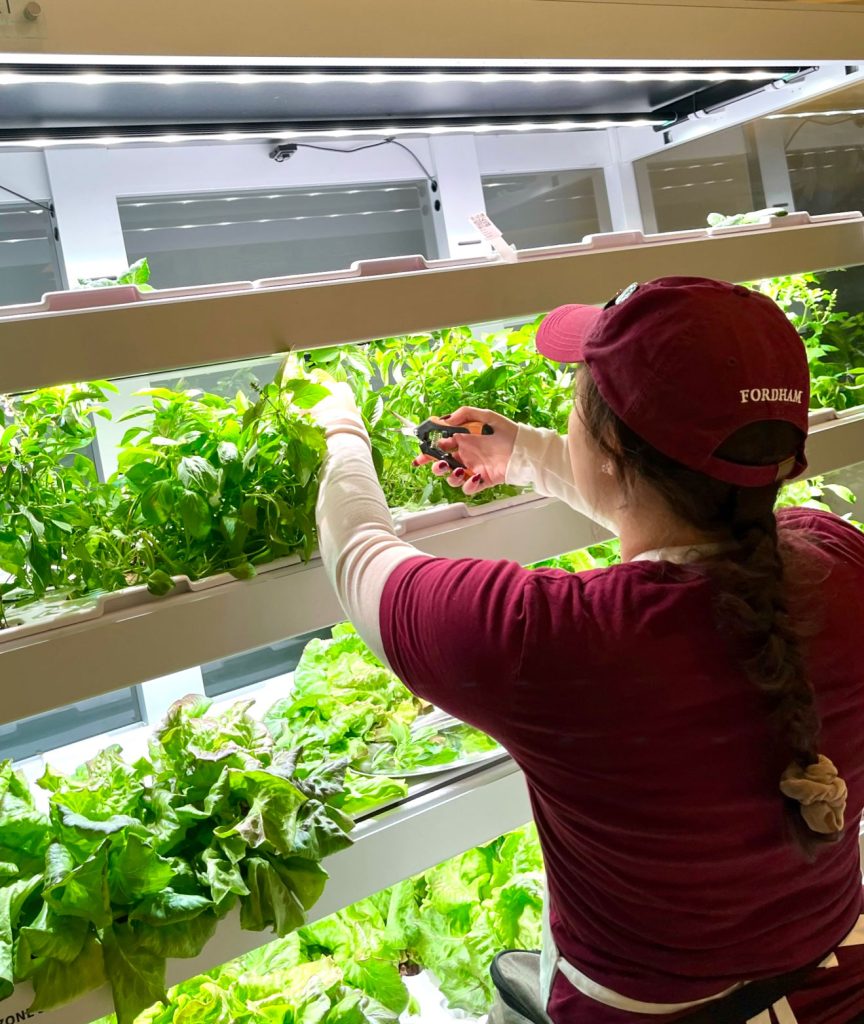
Academics
In the Classroom
Six undergraduate community-engaged learning classes offered in the Fall 2023 semester featured elements promoting sustainability: Anthropology of Food (Anthropology), Economics and Ecology of Food Systems (Economics), Thinking Visually (Visual Arts), Human Physiology (Biology), Consumer Behavior (Gabelli School of Business), and Leadership Integrated Project (Gabelli School of Business). At Fordham Law School, environmental law courses offered this semester included Environmental Law and Energy Law.
Fordham Law students wrote blog posts for the school’s Environmental Law Review on the Flint and Jackson water crises, NYC Local Law 97, the environmental damage caused by the fashion industry, and cell-cultivated meats.
Reading Laudato Si’
The Curran Center for American Catholic Studies held three seminars on Zoom this semester dedicated to reading Pope Francis’ encyclical Laudato Si’ and the 2023 follow-up, Laudate Deum. Visit the center’s website for more information on future seminars.
A Systems Approach
This semester, the Social Innovation Collaboratory and Career Center hosted a collaborative workshop on systems thinking, focused mainly on sustainability. The workshops, which were open to all undergraduate students, allowed them to explore the practice and application of systems thinking, which is rooted in a holistic approach to society’s more complex issues. The process is attractive to companies since it’s rooted in the idea of looking at complex problems with a new perspective. Contact Sadibou Sylla at the Collaborary for information on future workshops.
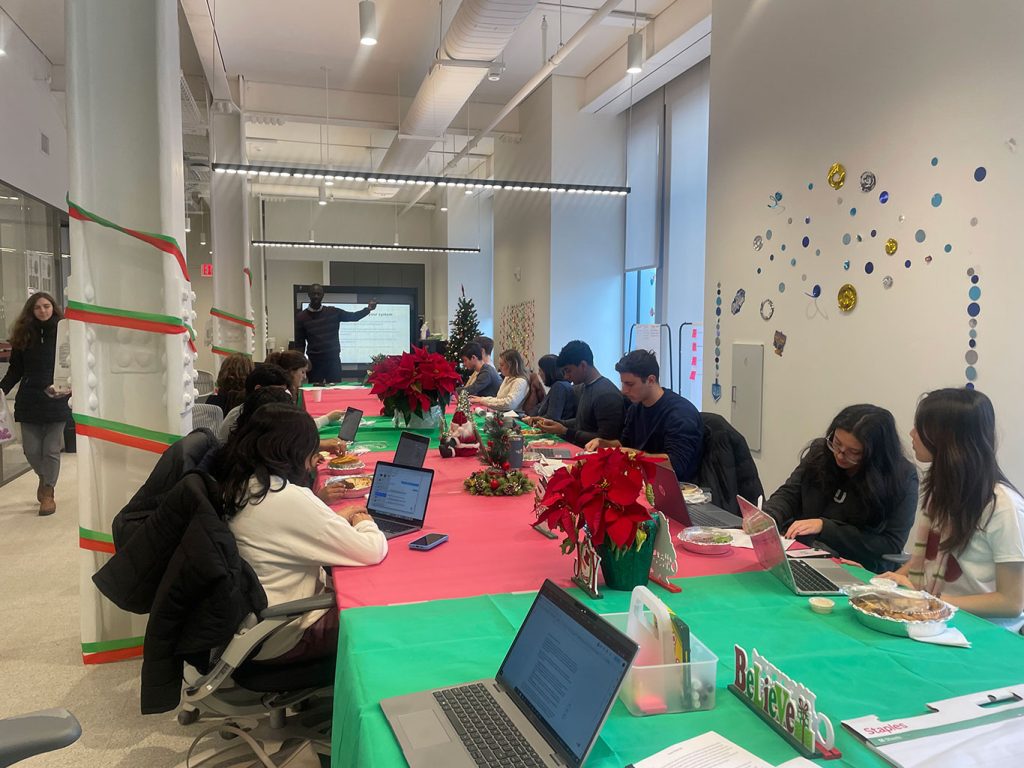
Students Take the Lead
Green Week: United Student Government sponsored Fordham College at Rose Hill’s Sustainability Week in November. It featured the Fordham Flea Pop-Up as well as a seminar on composting basics.
The Lincoln Center Environmental Club held a clean makeup tabling event on Nov. 30 to showcase the benefits of cruelty-free and clean makeup.
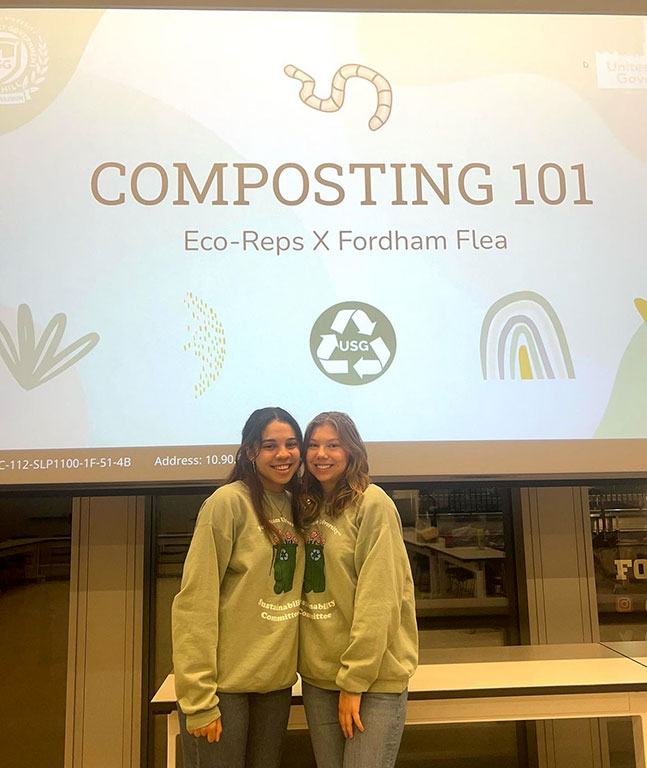
Community Engagement
As part of the Reimagine the Cross Bronx campaign, Fordham staff conducted weekend “walkshops” in the neighborhoods surrounding the highway. Funding came from a $25,000 grant from the New York City Department (DOT) that the Center for Community Engaged Learning received in October.
Fordham staff and students also held special Halloween and Thanksgiving-themed events at the Highbridge Farmers Market and community space, which was recently expanded thanks to an AARP grant.
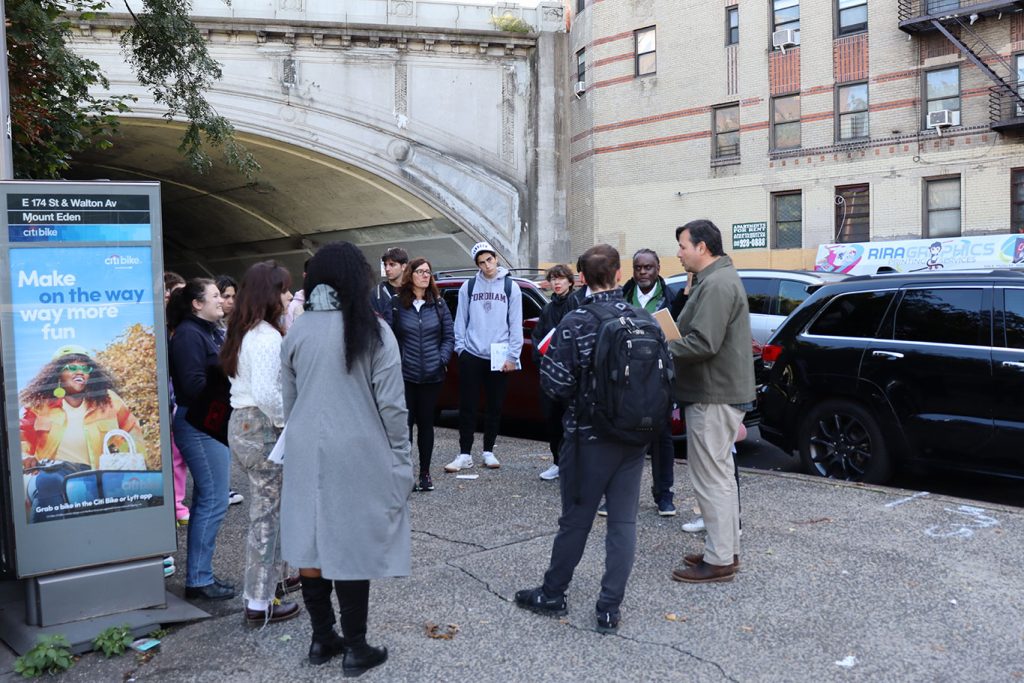
Faculty News
Marc Conte, Ph.D., professor of economics, published “Unequal Climate Impacts on Global Values of Natural Capital” in the journal Nature.
Stephen Holler, Ph.D., associate professor of physics, published “Education for Environmental Justice: The Fordham Regional Environmental Sensor for Healthy Air,” in the journal Social Sciences.
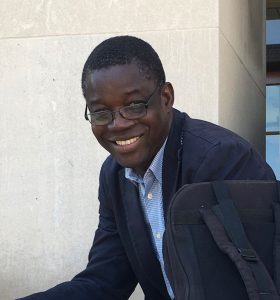
David Gibson, director of the Center for Religion and Culture (CRC), received $84,840 from the Porticus Foundation for the annual conference The Way Forward: Laudato Si’, Protecting Our Common Home, Building Our Common Church. The conference will take place in February at the University of San Diego.
Isaie Dougnon, Ph.D., associate professor of French and Francophone Studies and International Humanitarian Affairs, received $24,790 from the Wenner-Gren Foundation for research based on a local perspective on water and migration in West Africa.
Alumni
Giselle Schmitz, GSAS ’22, spent this fall working with the Coral Triangle Center in Bali, Indonesia—a nonprofit that connects governments, corporations, and local groups to help strengthen marine resources in the region.
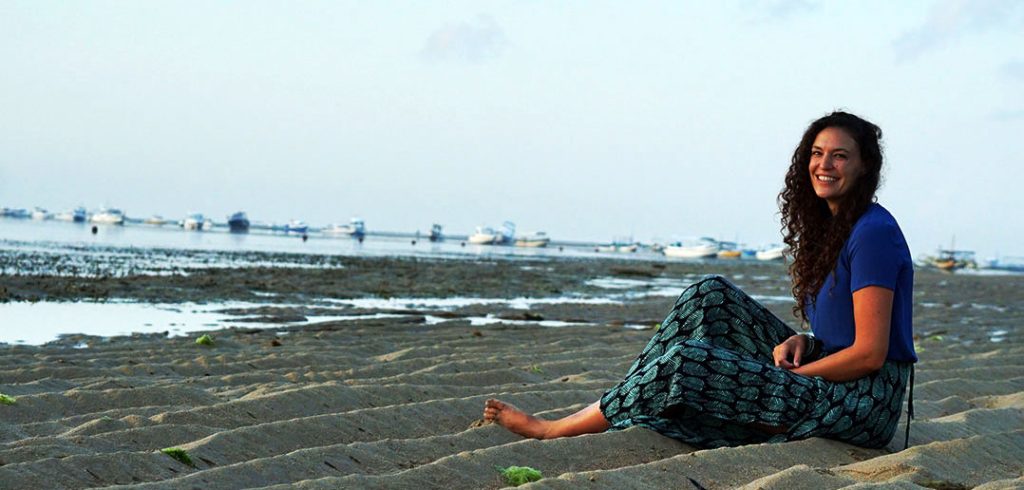
In Case You Missed It
It was a busy fall in terms of sustainability efforts! Here are some stories Fordham News covered that you may have missed: In October, the annual Fordham Women’s Summit focused on sustainability. In our theology department, a lecture for first-year students featuring Union Theological Seminary professor John J. Thatamanil connected religious supremacy to the destruction of the natural world. Four students have joined the Office of Facilities Management’s newly created internship program, while alumni are helping protect New York City’s birds and helping farmers adapt to climate change. The Gabelli School of Business hosted two Nobel Laureates at a conference on ESG. At the Law School, more than 20 students gathered in Central Park for a clean-up event for the annual Public Service Day, while alumna Melinda Baglio was honored for being a changemaker in the clean energy field.
Upcoming Events
Faculty Happy Hour: Sustainability and Environmental Justice
Open to all faculty interested in sharing ideas about sustainability.
Thursday, Jan. 18, 2024. RSVP: Julie Gafney, [email protected]
STEM Career Fair, Thursday, Feb. 15, Great Hall, Rose Hill Campus. Visit the Fordham Career Center next month for details.
Women of Color in STEM Career Panel, Wednesday, Feb. 28, Virtual. Visit the Fordham Career Center next month for details.
Social Impact and Non-Profit Micro-Fair, Thursday, March 14, 12th Floor Lounge, Lowenstein Center, Lincoln Center campus. Visit the Fordham Career Center next month for details.
Save the Date:
Climate Action Summit with President Tetlow: April 8, Rose Hill Campus
We’d Love to Hear From You!
Do you have a sustainability-related event, development, or news item you’d like to share? Contact Patrick Verel at [email protected].
]]>This year, all the students in the fifth cohort of Fordham’s master’s degree in health administration program received a valuable connection to that growing field: student membership in the American College of Healthcare Executives (ACHE)
On Aug. 8, the group co-hosted, along with the National Association of Health Services Executives (NAHSE), the “3rd Annual Better Together: Celebrating Diversity, Equity & Inclusion” event at the Lincoln Center campus. Several members of the cohort were invited to attend.
Shifting from a Clinical to an Administrative Focus
One of them was Su Su Oo, a native of Myanmar who left her home last year to escape political repression and violence engulfing the country.
Oo had graduated from medical school there and worked for four and half years at a hospital before pursuing a postgraduate degree in public health in New Zealand. Before settling in Dyker Heights, Brooklyn, she worked as a field support coordinator for the Myanmar Anti-Narcotics Association.
She soon found herself more interested in the administrative side of health care than the clinical aspects of the field. So she enrolled in Fordham’s program, which is offered through the Graduate School of Arts and Sciences.
“The courses are very comprehensive and cover most everything you would need to understand the health administrative field. I loved learning about things like the social determinants of health and the factors that affect the quality of health care overall,” she said.
“My communication skills and negotiation skills have also improved a lot through the group projects we’ve done.”
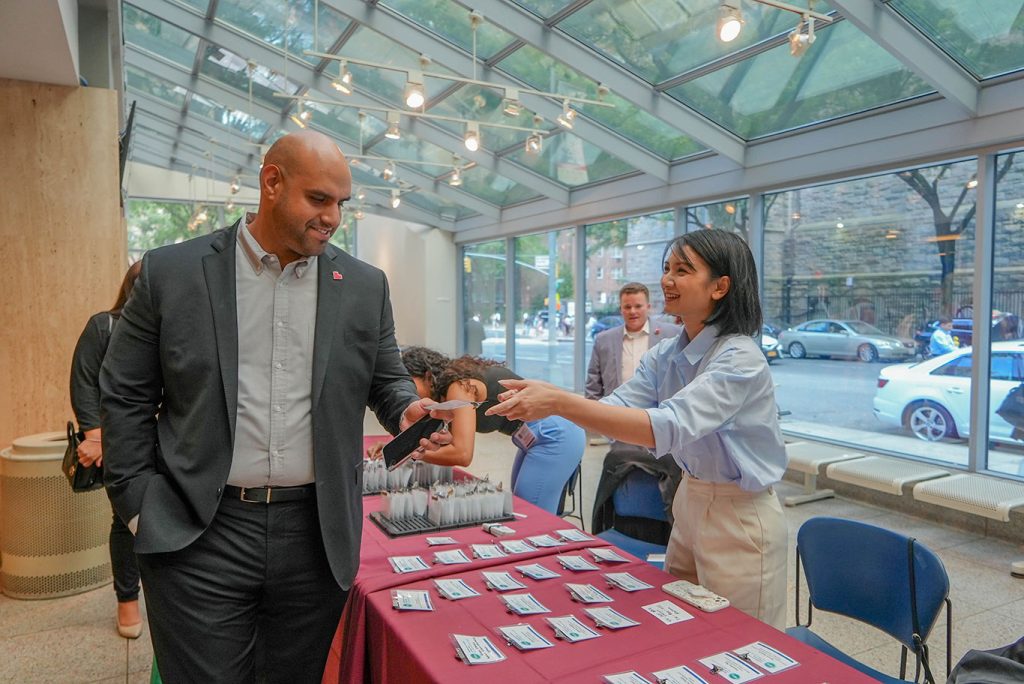
Developing Skills Beyond One’s Comfort Zone
Jasmine Morales, a native of Co-op City in the Bronx who currently works as a radiology billing associate at Memorial Sloan Kettering Cancer Center, earned a certified nurse assistant (CNA) license when she was in high school. Nursing was not ultimately in the cards for her, but Morales stuck with the field.
“In my mind, I said, ‘Even if I can’t be a nurse, I can still help people in other ways, as long as I’m still in health care,” she said.
Her capstone project, on opioid addiction in the Bronx, opened her eyes to the reality of the healthcare system disparities in the United States.
“Going through this program, you see the whole spectrum of health care. The disparities are not just in New York either; it’s global,” she said.
She also feels more confident speaking in public now, having successfully presented her capstone findings to her class. It wasn’t easy, though; at the time, she said she was on the verge of tears.
“I had to learn and keep going moving forward, and part of that is getting you out of your comfort zone,” she said.
“As a leader, at some point in your career, you’re gonna have to talk in front of an audience.”
Preparing Graduates for Current and Future Challenges
Caroline Pogge, Dr.P.H., director of the program, said the goal is to develop leaders who will be prepared to manage both current issues in health care as well as future ones, such as the COVID-19 pandemic and the continuous reverberations of the Affordable Care Act (known as Obamacare).
Past graduates of the program, which draws on experts from the Gabelli School of Business, the Graduate School of Social Service, the School of Law, and the Graduate School of Arts and Sciences. have included a medical review officer at Con Edison and a care coordinator at the Memorial Sloan Kettering Cancer Center.
“We want students to be able to say, ‘Hey, I’ve got a situation; I know how to dig into a problem regardless of what that problem is,’” she said.
]]>Tatiana Hyman, LAW ’22
I will always remember January 31, 2021, which was the day I got the phone call telling me I would be the editor of the Fordham Law Review. It was particularly significant for me because I’m the first Black person to hold that position. I am the daughter of Jamaican immigrants and the first person in my family to go to law school, so accomplishing something like that reassured me that I should never shy away from opportunities that seem daunting. I also thought a lot about students of color who have ever felt that certain seats are unattainable.
Ricardo Andrés Arocha, GSS ’22, M.S.W.
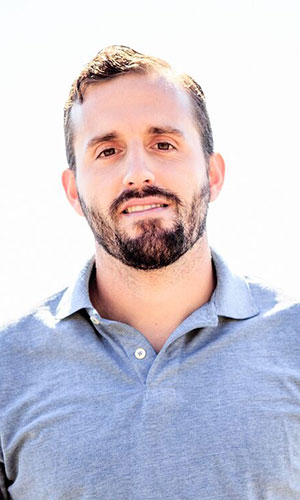 I was able to participate in a new program called the PIPELINE, and there was a monthly seminar where we would hear from people who have worked in the social work field. I will always remember how I got the privilege of a window into each person’s multiyear, and in some cases multi-decade, trajectory. I was able to develop a vision for myself as a social worker moving forward.
I was able to participate in a new program called the PIPELINE, and there was a monthly seminar where we would hear from people who have worked in the social work field. I will always remember how I got the privilege of a window into each person’s multiyear, and in some cases multi-decade, trajectory. I was able to develop a vision for myself as a social worker moving forward.
Originally, I was thinking I was going to aim to lead an organization, and not take on much of a clinical role. But I realized that I want to spend a few years after graduation honing my clinical skills and getting a license and accreditation. I don’t know that I would have made that choice without hearing those speakers.
Katherine Delehunt, GABELLI ’22, B.S. in Finance
I’ll always remember the last Fordham home football game. There was this big tailgate party beforehand. I remember walking in, and there were people from both Fordham and the opposing school celebrating everywhere. Parents were wearing their Fordham colors, there was tons of food, corn hole, the whole thing. It was a real encapsulation of how you can have the true college experience in the middle of New York City.
Jackson Elliott, PCS ’22 B.A. in English
The best thing I had in my life during the pandemic was Fordham. I will always remember when I realized I could go to school full time. I was doing live events and producing, and there was so much of my work that I couldn’t really do, because everything had shut down due to COVID. I had started working on my degree in 2014 and was just chipping away at it one or two classes at a time. Once the pandemic hit, I thought, “I’m definitely going back.” No one would have wanted something like this to happen, but it offered me the opportunity to finish my degree sooner. The way Fordham handled the pivot to remote was seamless, and I had wonderful experiences.
Natalie Blair, FCLC ’22, B.A. In Women, Gender, and Sexuality Studies
I am a part of the Office of Multicultural Affairs committee for LGBTQ History Month. We spent the first two months of school planning a whole month of activities, and the end-of-month celebration in October is something I’ll definitely remember. We had such fun decorating the room, we had music playing, dancing, we had empanadas. It was just a real moment of recognition for the hard work that we had done. These people are some of my best friends now, so I really appreciate having the chance to meet them, work with them, and put on great events.
—Reporting and photos by Patrick Verel and Tom Stoelker
]]>Full transcript below
J.D. Lewis: The eureka moment was in an English class. We were talking about The Merchant of Venice and we were talking about Portia, and the teacher said, “So you have to consider Portia as being a girl in a boy’s body, acting like a boy.” I was like, oh, that’s me. And so that was essentially the point at which I realized this is what my gender is.
Patrick Verel: When President Obama’s Department of Education issued guidance in 2016, that schools should allow students to use the bathroom that matches their gender identity, it was hailed as groundbreaking by supporters of transgender rights. But when Donald Trump took office in 2017, it only took a month for his administration to reverse course. Fast forward to 2021. Joe Biden reinstituted the guidance, and efforts to lift up and support people who identify as non-binary continue. In June of that year, for instance, the state of New York began offering the option of an X gender to anyone who did not identify as male or female. The federal government followed suit in September, allowing people to choose it on their passports. For those of us who are old enough to remember when President Bill Clinton signed the anti-gay Defense of Marriage Act in 1996, it’s fascinating how much things have changed. Over the last few months, I’ve talked to Fordham folks who have had insights to share in the topic of gender, either because of their work, their personal experience, or both. I’m Patrick Verel, and this is Fordham News.
When I first met J.D. Lewis, a professor of biology at the Calder Center in 2011, they had presented as male. At an event in 2019, Lewis presented as female. We recently sat down to talk about that journey.
Now, you told me that you realized something was different about you when you were four years old, right?
JL: Yes, that’s correct. And so two big events both occurred at the same time. I discovered my profession and I discovered my gender in one day. And it happened when my mom’s older sister was visiting us. And she is a professor, and so she was my motivation to become a professor. And at the same time, I realized, oh, I’m a girl. And at the time, I didn’t think much of it. I’m four years old, and I just figured this is something that happens to everyone. And as I got a little bit older, I start to realize that I didn’t just feel like a girl, but that I kind of fit somewhere in between. And again still assumed this is how everyone felt. And by the time I was starting middle school, I realized, oh, this is pretty unique. And I have to admit that, at the time, because I identified more as a girl, I was hoping that puberty would give me a different body than I have right now and that I would end up having a girl body to go along with my sense of being a girl gender.
And again, at the same time, we didn’t have the language to be able to explain that, and so it was really difficult for me to be able to convey to other people what I viewed as my gender. And it was difficult for other people to tell me what they viewed as. And so, kind of the Eureka moment was in an English class, we were talking about The Merchant of Venice and we were talking about Portia, and the teacher said, “So you have to consider Portia as being a girl in a boy’s body, acting like a boy.” I was like, oh, that’s me. And so that was essentially the point at which I realized, this is what my gender is. Yeah.
PV: So at the same time that you figured out what you wanted to do with your life, you figured out who you were as well. That’s a lot for being four.
JL: It was. And of course, just like my gender, my ideas of what I wanted to be professionally shifted over time. But ultimately, obviously, I ended up becoming a professor, and in fact, that was partly because of my gender identity. I wanted to pick a field where I would be able to be comfortable with the way I dressed, so I knew I couldn’t work in the business world, because I am not comfortable in a suit and tie. And I wanted to be able to work in a field that was less gender-biased, for lack of a better way of putting it, than most of the STEM disciplines. And botany, at the time, was a field that was more open and welcoming to people who were not male. And so that’s how I ended up, partly, as a botanist and how I ended up as a professor.
PV: Really. So that influenced your choice even within the sciences.
JL: Yes, very much so. And then one other part about that is I was really interested in plant reproductive biology because plants can be whatever they want. You can have male flowers, you can have female flowers. You can have plants that produce male flowers some years and plants that produce female flowers some years. You can have flowers that are both male and female. You can have flowers that are male and have other flowers that are male and female on the same plant. You can have plants that have female flowers and male flowers at the same time. I’m like, this is perfect. This is me.
PV: Wow. Okay. That’s amazing. So that’s, what an interesting… and obviously you’ve stuck with it. It’s worked well for you.
JL: It has.
PV: Yeah. What changed for you between 2011 and 2019?
JL: Good question. And I think two things really were what made me change, how I approached this. And one was we had a better sense of what terminology we could use to describe our experiences. And so the idea of gender fluidity, for example, that term became much more commonly used. People started to understand what it meant. And so people could start to use it to identify how they felt because other people would understand what it meant. So I think that was part of it. And another part of it was working with students who were concerned about representation. And I had a meeting with one of my grad students who was lamenting the lack of representation of certain groups. And I realized that I needed to do a better job of representing, that it wasn’t just enough for me to be supportive and to be effectively an ally. That because this is my experience, I needed to be my full self.
PV: Yeah. When was that?
JL: It was about six years ago now, around 2015.
PV: And how do you identify today?
JL: So as a biologist, I view gender from a non-binary standpoint. And obviously, I’m gender fluid, and so I fit within that category as well. But because when I was young, I didn’t identify with a specific gender, now I typically use the term either genderqueer or agender to identify myself.
PV: So I think there’s this assumption that if you feel, as you do, that you aren’t the gender that you are assigned at birth, that you would naturally gravitate towards transitioning, either with things like hormones or with surgery. You’re not interested in that, right?
JL: So I think for a lot of people who are trans in whatever way that they’re trans, transitioning is clearly a critical part of being who they are, right, being their full self. And gender affirmation surgery, clearly, is really important, and hormone therapy can be really important. I think for me because I don’t identify with a specific gender, it makes it difficult for me to decide what I would transition to. And because for me, the fluidity is, okay, so I’m feeling more like a girl today, or I’m feeling more like a boy today, that also makes it pretty difficult to decide what to transition to.
And then another aspect of it is that I’m already fairly androgynous in terms of my build, and so my face is fairly masculine and obviously my voice is fairly masculine. But if you look at the proportions and I’m trying to buy clothes, then women’s clothes actually fit me better than men’s clothes do. And so even before I was open and out, I mostly wore women’s running gear, for example, because women’s running gear just flat out fit me better.
PV: What’s it been like since you decided to be more open about your gender?
JL: So there’s been a lot of support, which has been really nice, and I feel for the most part very welcome. One of the interesting things for me was that, when I was younger, I would be teased a lot. And people assumed that my gender isn’t what was different, that it was my sexuality. And so I was called a fairy a lot when I was very young, and I was called a different F-word when I was older. And that was basically on a daily basis that I would get this. It was whenever I was out and people didn’t know me, I would get the F-word, and it’s like, oh, you think you’re so original. And what’s been interesting, since I started dressing more like how I feel about my gender, is most of those kinds of comments have stopped. I still get death threats, and riding on public transportation can be kind of challenging because you always get someone who’s looking at you like, you don’t fit in.
But for the most part, people have been really supportive, so it’s been really nice. And again, for me emotionally, it’s been much better. So I feel like I am being able to be my full self now, and I’m able to go about my day without worrying about how I look. And to be blunt, before I started dressing the way I dress now, every time I was out, I felt like, I look crazy. I look ridiculous. This is not who I am. Now I feel like whenever I go out, I’m like, I like how I look. I like that people see me this way. And so that’s been a big change as well.
PV: I’m sorry. I have to follow up on this. Death threats?
JL: Yeah. I get people riding on the train who, as they’re walking past, say things like, you’re an abomination, you should be killed, or you’re a Satan worshiper or whatever, right? And it’s kind of like with the F-word, it’s like, oh, you think you’re so original. So. And I actually have had people physically accost me. And so it goes beyond just words, but actually, physically accost me.
PV: And what about here at Fordham?
JL: So for the most part, people have been really supportive. It’s been really nice. It’s been a journey. And I say that because I realize for everyone around me, it’s been a journey as well, right? And so my transition, I try to do over a fairly… and when we’re talking about transition, of course, it’s not from a medical standpoint. It’s more as how I present or how I dress, it’s my hair length, it’s things like wearing makeup. And I realize that for a lot of people at Fordham who have known me for a long time, it is different. And so I realize that it’s been quite a journey for other people as well. And so I feel that my being able to be my full self is a testament to the fact that most of the people of Fordham are nurturing and encouraging about it and are supportive about it.
PV: Yeah. Yeah. That’s great to hear. That’s great to hear. I mean, it’s so disturbing to hear about these kinds of things. You talk about the public transit. There’s this idea that we hold ourselves to, in New York City, that we’re so enlightened, but you know that that’s not the case at all, in many settings with many people. So it’s disturbing to hear that, and I’m sorry to hear that. That can’t be easy, but at the same time, I can’t say I’m all that surprised.
JL: Yeah. And thank you. It is easier in New York, I feel, because New York is very much a you do your thing, I’ll do my thing kind of place, which I think is good in this kind of situation.
PV: That covers all the questions that I have formally written down.
JL: Mm-hmm (affirmative).
PV: There is one more though.
JL: Oh yeah, okay.
PV: That I’ve been thinking about, and that is to say your family. Is that something that you feel like you could talk about?
JL: Yeah. I’m willing to talk about that. My ex-wife and I are you get along… well, we co-parent our children pretty effectively. Our kids joke about us being essentially co-workers as parents because we both work together on it. And she’s asked how do I identify, because of course she sees me like this, just like everyone else does. And same answer, right. It’s just kind of like, I don’t really identify with a specific gender. And with my kids, a couple of my kids are queer, and they’re very comfortable with their queerness. And so I, in some ways I feel like that, again, it’s this idea of representation, that for me to be my full self is good for them, because it lets them know that there are people even in our family that are supportive.
PV: Talking with Professor Lewis gave me a great local perspective on the subject. So, for my next interview, I decided to expand beyond our borders. Sameena Azhar, an assistant professor at the Graduate School of Social Service works with Khawaja sira, a group of third gender people who have lived in communities in Pakistan since the 16th century. Did I say that right?
Sameena Azhar: Mm-hmm (affirmative).
PV: I did. Khawaja sira.
SA: Khawaja sira.
PV: Just rolls right off your tongue. Yeah.
SA: Yeah, yeah. And the accent is for the a, on the A at the end, so Khawaja sira.
PV: Sira. Oh, okay.
SA: Mm-hmm (affirmative). Yeah.
PV: So now, in my intro, I noted that in the United States, you can now pick a third gender on official documents. That’s old news in South Asia though. Why?
SA: Well, it’s not super old. In 2014, the Supreme Court of India allowed for the creation of a third gender. So rather than registering as an M or a male, or a F as a female, you can register as an E. So this third gender option. And similar policies have also been passed in Pakistan, Nepal, Bangladesh, not in Sri Lanka and Afghanistan, but the rest of those South Asian countries passed similar policies. Additionally, in India, Hijra are considered a scheduled caste.
So the scheduling of castes and tribes in India is a process that dates back to colonialism, and there were certain groups of people or communities that were considered to be scheduled as caste or tribes. And these individuals in modern India get a sort of affirmative action-style status by the government. So there are social entitlements that are available to them that are akin to welfare or food stamps, allotted seats in the representative government at the local level, so they’re called panchayats, so they’re reserved seats for people that are from these communities. So they’re pretty progressive actions to try to include these folks who are fully socially within South Asian society. And it’s a community that has been really gripped by both a long history of being honored and exalted, and also a long history of being marginalized.
PV: Now, I just spent a lot of time talking about the Khawaja sira and getting that correct, but you just referenced another group in India.
SA: Yeah. So, I mean, we’re basically talking about more or less the similar identities of third gender and gender-nonconforming identities. In India, the nomenclature is most commonly called Hijra.
PV: Hijra.
SA: Right. There’s other names for it in India as well, like Kinnar, Khusra, Aravani. There’s many names for this. In Pakistan, the name is Khawaja siras.
PV: What does colonialism have to do with all of this?
SA: So prior to British colonization, under mogul or Raj, but control, there was much more state-sanctioned support for these communities. So folks who were hijra or Khawaja sira would often work as courtesans or advisors or handmaidens in the royal court. And with the coming of colonization, the identity of being a hijra became criminalized. So in 1871, the Criminal Tribes Act made hijra criminals. And then additionally, Section 377 of the Indian Penal Code, which is borrowed from the British penal code, criminalizes what is called carnal intercourse against the order of nature. Right? So this essentially is interpreted to be homosexuality or more specifically sodomy.
PV: When you talk about these folks that embrace this way of being, are we talking about people who would typically be identified as male embracing femininity or vice versa?
SA: No, typically it is folks who’ve been assigned male sex at birth and identify as either women, or as men and women, or as a third gender person. It’s much less typical, I mean, pretty much, for the most part, doesn’t exist, to have somebody who was assigned female sex at birth, who may identify as a man and be called a hijra. So it is quite specific to what we would call in the West, trans women. But the third gender classification of E does encompass anyone, regardless of whatever sex was assigned at birth, to identify as E.
PV: And how does this all relate to what you do here at Fordham?
SA: So my research really began in south India. My family is from a city called Hyderabad. It’s where I did my dissertation research, so mainly looking at issues related to HIV and gender non-conformity stigma of people who are living with HIV, are HIV positive. And my work in Pakistan has been somewhat of an extension of that. I’m not focusing there on folks who are HIV positive. There’s also a much, much lower prevalence of HIV in that part of Pakistan, so my research there is focused on an area called Swat, which is in Khyber Pakhtunkhwaqua, and that is the northwest province that borders Afghanistan.
So it’s been a very interesting place to be doing research, first through the pandemic, but also through the huge influx of Afghan refugees that have come in the past several months. The focus of those interviews and surveys that we’ve been conducting in both India and Pakistan have been really around trying to figure out how to reduce these experiences of the stigma that people are encountering within their families, within their communities, within employment settings, within healthcare settings, knowing that these experiences contribute also to poor mental health, and most probably acutely to experience the violence or homicide against gender-nonconforming people.
So one of my participants, research participants in India had been murdered during our research, and it really just drives home that these are issues that impact people’s lives in very intimate and violent ways.
PV: Yeah. Yeah. Oh, man, that’s brutal.
SA: Yeah, yeah. Truly was.
PV: Daniel Alexander Jones, a professor of theater who performs under the stage name Jomama Jones, first introduced me to the concept of gender fluidity when I met him in 2013. Now, Daniel, Jomama has been a vehicle for you to try to get people to see both themselves and others in a new light. Do you feel like you’re seeing some of the changes you were hoping for?
Daniel Alexander Jones: Oh, Patrick. That’s a good question. Yeah. I think were you to look at maybe 2010 and look forward at where we seemed to be heading as a nation, we’ve gone in a very different direction.
PV: Do you feel like there’s been a backlash?
DJ: There are people who believe their way of life is threatened by the changes that are happening, or even by, and this may be a more accurate way to say it, the naming of things that have always been there, but the taking up a space around those things, right? We know that those we call trans folk now have always been here, throughout history. This is not a new phenomenon, but it is culturally shaped in such a way that claiming sovereignty and truth and ownership of that identity is going to be a threat to someone for whom that identity’s invisibility is necessary for them to understand themselves, for them to feel their own sense of power, right? When you think about how that’s connected to the last five or six years of our national experience, it’s sobering.
PV: The last time we talked, you said that so much of the conversation about gender fluidity is about how we encounter someone who is different from ourselves, and what happens to us if we fully accept them. Can you elaborate a little bit on that?
DJ: This was originally, Patrick, from my perspective as an artist, because I was thinking about, both in my work professionally and also in the classroom, what role curiosity plays. The idea of engaging something you don’t know and being heightened or quickened or energized by the unknown, as much as you are by the process of naming and pointing out the things that you do know. And for an artistic process, whether it be writing or acting or directing, whatever the thing is, vital work depends on that curiosity. And it is that destabilization and the reaching for language to articulate what you’re feeling, the comparison of this new feeling to things you have experienced before. And also, if you will, the surrender into the possibility that that new experience has. All of those things are so necessary.
And what I began to encounter in the classroom, and what I began to encounter professionally even more so, was this sense of, we’ve got to name it and know it. What the problem is rooted in is a kind of taxonomical approach to life. Meaning that, if we think about taxonomy, we think about this idea of naming, delineating, putting things into categories. I’m thinking very often of those butterfly cases. Like those, the people who go out and collect them, and they pin the butterfly, and they name the butterfly, and there’s a sense that it is that thing. But we know that butterflies in life move. What they came from you don’t get in that pinned creature. So there’s so much of the story that’s missing from that pinned moment in time.
And then too, we then begin to think about exemplars of a particular group. Like this is what this type of thing looks like. And the connected part of that is we then begin to assume that something that looks like that, that has the same shape or form or the same name, will have the same content. Why? Well, in part we know it’s because our brain wants to filter out the things that are familiar so that we can pay attention to the things that aren’t. But I think the artist has a responsibility to deliberately engage what we don’t know, to deliberately destabilize what we think we know. It is part of our social responsibility.
And I think one of the things that this question around gender fluidity rubs at is that, if we live in a culture that has defined gender according to these formal shapes, whether they be shapes of thought or shapes of material of the body, we then eliminate the content. And that subjective content is the truth for that individual. So what does it mean that we would center a process by which I can have my observations, but I can’t then overwrite my truth of what those observations mean onto you before I get to know who you are, before I hear from you. Because as is so often the case, especially with folk who are dealing with expressing their own gender fluidity, very often what’s on the inside doesn’t match, quote-unquote, what’s on the outside. And so if I come to you and I have determined your interior by your outside, then I have done a violence to you.
PV: Talk to me about your own journey. How has your act changed since you started?
DJ: I was born into and raised in a worldview that was so profoundly shaped in the macrocosmic way by the civil rights movement, like the freedom movement and the workers’ movement, the grassroots movements that created the community I grew up in. Also, the courage of my parents who had an interracial marriage at a time where that was really forbidden, and the power of my community, which was a black community, working-class in western Massachusetts, that also was the house for a kind of multiethnic enclave. All of that to say that the culture that was born from that mixture of people, and that particular time, was in many ways set in opposition to the world that I entered when I started to go to school, which was a hierarchical world where race had a hierarchy, gender had a hierarchy, class for sure had a hierarchy.
So I had very early on to learn that I knew things about life that many of the people that I was going to meet in this other world didn’t know. And I also had to understand from a very early age, and I’m talking about memories from kindergarten, first grade, second grade, that many of the stories that were in that new world about who I was, about who my parents were, about who the people I loved were, were false. And I had to have the inner resolve, even before I had language to articulate it, to say, that’s not true. They don’t know.
And it’s when I became aware of my sexuality, and I understood that I was gay. What I understood is, just like I talked about those two different worlds, I could also look and say, oh, this is what is posited as being a boy or a girl or a man or a woman or… I could look at what the rules were supposed to be. So again, I came into this all at a time when I was looking around and saying, oh, wow, everybody’s playing this game. Everybody’s adopting these roles. And this person that I’ve known my whole life is now suddenly a jock or a girly girl or whatever. And I’m like, oh, it’s so interesting to see the person I know, take on and perform an extreme version of gender, as a way to get power, as a way to find their security, as a way to name themselves and be part of this larger configuration of students in this public high school.
And I knew it wasn’t me. So if I don’t fit any of these things, then the pressure, which I think is what a lot of young people face, is how do you conform? How do you figure out how to get access to or move in that system? Or the real danger, how are you taking that in, like do you try to fight your way back into the thing? And maybe the blessing and the curse that I had was like I told you, I had an experience and a bodily experience of something else.
One of the things that’s interesting, I’ve been teaching at this Jesuit university, and I hear a lot about the teachings of Christ. And I think one of the primary ideas is that you greet strangers as holy presences, that who you don’t know may be an angel. It’s your responsibility to take care of your fellow human being. Care means presence. Are you willing to be present with another human being? And I’m shocked always by how many people are unwilling to do that. I shouldn’t be shocked, but I remain shocked.
PV: Talking to Daniel shed light on how the culture is changing, but of course, culture can’t thrive if it’s not given the space to do so, which is the realm of law. For that, I turn to Elizabeth Cooper, a professor of law and the faculty director of the Feerick Center for Social Justice at Fordham Law School. Now you were involved in the passage of the Gender Expression Non-Discrimination Act or GENDA, a 2019 New York law that was originally part of a previous law that was passed in 2002.
Elizabeth Cooper: I have had the real pleasure of being a member of and an advocate for the LGBTQ communities for many decades. And I remember very clearly when we were trying to get the Sexual Orientation Non-Discrimination Act, otherwise known as SONDA, passed through the state legislature. And there were a number of advocates that were trying to get the bill passed in its original form. And that would’ve prohibited discrimination based on sexual orientation, which is being lesbian, gay, bisexual, as well as on gender expression or identity. And those phrases typically refer to people who are transgender or gender non-conforming. The advocates were told that they could get SONDA passed, but only if they took out the protections for gender expression.
And the advocates agreed to do that with the notion of, we’ll come back next year, get the gender expression non-discrimination provisions passed. Well, it just so happened that SONDA was passed in 2002, became effective in early 2003, but it was not until 2019 that the Gender Expression Non-Discrimination Act actually was enacted. The law is so powerful, because it prohibits discrimination on the basis of gender identity or expression in employment, in housing, in places of public accommodation, in education, in countless areas, basically adding gender expression and identity to the long list of identities that cannot be the basis for discrimination in New York State.
PV: When it comes to the push and the pull of these laws, you’ve said that Jim Crow laws can be a helpful reference point. Can you explain why?
EC: If you think about Jim Crow laws or Title VII, which prohibits discrimination in employment, or the Americans with Disabilities Act, which prohibits discrimination on basis of disability, you have lots of prohibitions on discrimination based on an individual’s identity, their core identity, who they are. Historically, I think the Supreme Court often thought of these as immutable characteristics. Not all of them are so immutable, but they are basically aspects of identity that go to one’s core. They also have absolutely no impact on how well one can perform one’s job. So if you have a person who is an excellent lawyer, for example, it should not matter whether they are transgender or cisgender, meaning that their physiology and their gender identity aligns, cisgender. And so, why should we permit discrimination based on gender identity? It makes absolutely no sense. This has nothing to do, like race, like sex, like religion, with how one can do one’s job.
I think that thinking about this historical context is also helpful when we start to think about the ways in which some people argue that religion or biblical values mean that one should be able to discriminate against people who are lesbian, gay, bisexual, transgender, gender non-conforming, and so on. It’s important to look historically to the kinds of arguments that were raised against Title VII and other laws that prohibit discrimination based on race. For example, people argued that it would be wrong to have black people and white people in the same bathroom, that it went against the Bible, that there were risks of violence. There were people who argued that separation of the races was mandated by the Bible. And in this context, I think that we are getting to the point where we understand that gender identity or expression or sexual orientation, this is not a matter of choice or going against God or going against the Bible. This is just a matter of who we happen to be.
PV: It seems like people either are willfully ignoring history or just don’t know about it.
EC: I think most people don’t know about it. I think that the point is just to look at people for the value of, for example, employment, the job that they can do. Why would you ever want to tell someone who’s gender non-conforming that they can’t walk into a movie theater? Or why would it be okay or should it be okay for a doctor to say to a transgender person, I don’t want to treat you?
PV: You’ve been involved in this advocacy for 25 years with groups such as the law school’s LGTBQ student group. How have things changed within the movement itself in that time?
EC: I confess that I am just dumbfounded by the changes that have happened in my lifetime. And when I say dumbfounded, I mean in the best way possible. When I first started teaching at Fordham, I was concerned about coming out. I remember that the LGBT law student group sometimes met off-campus, so its members would not have to worry about being seen walking into a room where people knew that the gay group was meeting.
The attitude today towards lesbian, gay, bisexual, transgender, gender identity more generally, is just striking. I see law students and undergrads. I have a niece who’s 18 years old. I see her and her peers having a comfort with people who are different from themselves. And they don’t look at it as something that should require segregation. They look at it as something to learn about, and they want to embrace the richness of diversity in their lives. So you have straight people, like my niece, joining the high school Gay-Straight Alliance. You have kids coming out as teenagers in high school, sometimes middle school. You have people claiming their gender identity or presenting themselves in gender non-conforming or genderqueer ways much earlier on.
There is a real, tangible move away from understanding gender as a binary. There is a much greater acceptance, understanding and acceptance, that gender, like race, is very socially constructed. It’s not that men don’t typically have more testosterone and women typically have more estrogen, or we have different body parts, but that, in the way we present ourselves, some of our rules are arbitrary. Why should only women wear nail polish? Why should only women wear dresses? Why should only men wear ties and Oxford shoes, right? It has nothing to do with who you are and your core values as a human being. If anything, how much more wonderful this world is when people can be their full selves and live their full lives, whether it is with their families of origin, or in the workplace, or walking down the street in the middle of New York City or the middle of any other small town, anywhere in this country.
]]>
Speech Acts, which kicks off this week, will bring together high-profile speakers such as George Stephanopoulos and Nikole Hannah-Jones for eight panels and lectures to address an issue that has become increasingly fraught over the last few years.
“We’ve had a long-standing ferment in society, in the culture, and perhaps most intensely, on American campuses, about freedom of speech—what you can do, what you can say, and what can be discussed and in what form,” said David Gibson, the director of Fordham’s Center on Religion and Culture.
The center addressed the topic in March when it held a discussion on cancel culture, and over the summer, Fordham Provost Dennis Jacobs, Ph.D., asked faculty to propose their own ways to talk about what Gibson called “the lifeblood of university life”—the free and open exchange of ideas.
The first panel, “Political Discourse in a Polarized Age,” will take place Thursday, Oct. 7, from 3:30 to 5 p.m. at the Lincoln Center campus. It will feature Stephanopoulos; Kristen Soltis Anderson, a pollster and author of The Selfie Vote: Where Millennials Are Leading America (And How Republicans Can Keep Up) (Broadside Books, 2015); Robert Talisse, Ph.D., professor of philosophy at Vanderbilt University; and Roshni Nedungadi, a partner at HIT Strategies. Monika McDermott, Ph.D., professor of political science, will moderate.
Hannah-Jones will speak on Feb. 1. Jones, the creator of the New York Times’ “1619 Project” on American slavery and its consequences, was denied tenure at the University of North Carolina in June, and subsequently joined the faculty of Howard University. Her story generated enormous debates about academic freedom, and lawmakers in Arkansas, Iowa, Mississippi, Missouri, and South Dakota introduced bills to ban teaching the “1619 Project” in schools. She will be interviewed by Janai Nelson, associate director and counsel at the NAACP.
Catherine Powell, a professor at Fordham’s School of Law who was instrumental in inviting Hannah-Jones, said her work is key to understanding how the United States is undergoing a backlash similar to the one that happened in the 1960s in reaction to the civil rights movement.
“As a society, we’re currently having a debate about who gets to speak, who gets heard, and whose ideas are valid,” she said.
Hannah-Jones’ 1619 Project has been a major force in this debate, she said.
“That was a way to make visible certain ideas and certain histories that many Americans have been unaware of, that the history of Black Americans goes back 400 years, not just to the country’s founding,” she said.
Powell said it’s crucial that the educators are committed to the truth and shun “alternative facts” and disinformation.
“At the same time, it’s important that the university is a place where all ideas are welcome, even unpopular ones and unpopular speech, that we learn to be agreeable to being disagreed with, and that we learn from each other,” she said.
“Being open to the possibility that our ideas may evolve, and hearing others in a place where we can each speak freely and respect each other is critical to learning.”
The lectures represent the depth and breadth of the expertise of Fordham faculty. Miguel Alzola, a professor from the Gabelli School of Business, will moderate a panel on Oct. 15 titled “Is Free Expression at Risk in U.S. Organizations?” Abner Greene, a professor at the School of Law, will moderate “The Promise and Limits of Our First Amendment,” on Jan. 26. And associate professor of communications Jesse Baldwin-Phillippi, Ph.D., will moderate “Speech Impacts: ‘Cancel Culture’ and the Consequences of Our Words” on Nov. 4.
The Center on Religion and Culture is contributing with “The Quality of Mercy: Justice, Forgiveness, and Public Discourse,” a panel in the spring on a date to be determined. Gibson said the plan is to explore whether American culture is inflicted with a puritanical streak that leads people to be intolerant and unmerciful toward others, as well as incapable of forgiveness.
“My biggest concern is that that we only attempt to approach this through the lens of rights, or policies, or grievance, and I think we need to approach this from a spiritual and social perspective. This is about our relationships with each other,” he said.
As for the series, Gibson said he’s optimistic that there will be healthy disagreement among participants and audience members.
“More than any particular topic, speaker, or event, I hope the fact of holding this series will contribute to a solution because you’re going to bring people together in a space to discuss these things,” he said.
“What we’re trying to do is to model what good speech looks like, what a constructive environment for education looks like.”
In-person attendance for the series is limited to the Fordham community, but the series will be live-streamed. Register here.
]]>
His arrival at Fordham Law brought some twists though. Intrigued by the progressive transformative justice policies going on at the Kings County District Attorney General’s office, he interned there the summer of 2019. But he became discouraged by the many repeat offenders cycling through the office in the short time he was there. He decided instead to intern remotely with the Center for Constitutional Rights, to learn more about international human and civil rights litigation. There he became interested in movement law.
“I gained so much exposure to different attorneys who were doing all kinds of work, not only at CCR, but across the nation and internationally, and I found that experience gave me some insight as to what the day-to-day work of a litigator who’s practicing movement lawyering would look like,” he said.
Movement lawyers support and advance social movements, both through traditional lawyer work in areas such as trials or housing, and through community events, like organizing free weekend classes for citizens to learn more about their rights under the law.
“The role of the movement lawyer isn’t a confined or restricted activity. It’s many different things, and it’s based on what the community needs and what the community is demanding. It’s another way of just simply empowering people,” said Johnson, who is one of Fordham Law’s Stein Scholars—a diverse group of law students committed to public interest law.
After his CCR internship, Johnson still felt a yearning to work directly with clients. Last fall, he began working with the Law School’s Family Advocacy Clinic.
“I had trepidations about doing only direct services work, because I care about institutional and systemic issues, but I realized there can be a balance of the two in various ways, and that’s where creativity comes into play,” he said.
His final internship, with the group Movement for Family Power, confirmed for him that empowering local communities is what he wants to do. This fall, he’ll join the staff of the Bronx Defenders as an entry-level attorney.
Johnson channeled that commitment to empowerment on campus as well; during his second year, he was president of the Black Students Law Association. The group helped the Law School craft a plan to address systematic racism within the college.
“I had a number of students who I worked alongside to try to make Fordham a better institution,” he said, singling out current and past students Christina John, Taylor Carter, Hema Lochan, Dana McBeth, Diana Imbert, and Leena Widdi.
“They’ve had a tremendous impact on my ability to develop and lead, as well as figure out my own path.”
Johnson acknowledged that completing his studies was difficult. As someone who didn’t know his father and had few male role models growing up, he said that the guidance of Professor Ian Weinstein, his Stein Scholar faculty mentor, helped him a great deal. Adjunct professor Kenneth Montgomery, whose trial advocacy class Johnson took, was also an inspiration.
“As a Black man, he showed me who I could become and how I could do it,” he said.
Johnson was raised by his mother and grandmother, who he said gave him “a sense of identity.” But it wasn’t always easy.
“I watched my mom struggle every day to make life bearable and enjoyable, and she did her absolute best. But I also saw throughout my own city that my reality was quite common. I witnessed a lot of the injustices that were happening, whether it was in the education system or the rampant homelessness or the hidden history of my city when it came to enslavement,” he said.
Literature played a part in Johnson’s developing identity as well, particularly Toni Morrison’s 1970 novel The Bluest Eye, which he read his senior year at Morehouse.
“It really put into perspective the ways in which Black youth are robbed of their innocence, and how that has a lingering effect throughout one’s lifetime.”
It was a different way of understanding how literature could be written, and how we can share our real-world experiences with others. That’s something that I try to bring into my legal work whenever possible.”
Leah Hill, a clinical professor of law who oversees the Family Advocacy Clinic, said Johnson displayed a sense of humility and commitment to lifelong learning that would serve him well. She noted that to be a successful movement lawyer, one needs to engage people of all walks of life respectfully. She saw that in Johnson when she first met him, and again at the clinic.
“He knew how to show compassion and empathy without being paternalizing or condescending, or pitying clients. He was just really a pleasure to work with, because I could see how deeply committed he was to social justice,” she said.
]]>The Ever Given was freed after six days, but Lawrence Brennan, a retired U.S. Navy Captain who served aboard the USS Nimitz aircraft carrier and now teaches admiralty and international maritime law at Fordham Law, said the snafu illustrates just how dependent we are on a system we often take for granted—one that has real vulnerabilities worth considering.
Listen below:
Full transcript below:
Lawrence Brennan: Look in your room, look in my room, look in the classroom, look everywhere, look in your closet. Everything that we buy today is most likely partially the result of global trade.
Patrick Verel: The other day, I did something absolutely unremarkable. Thinking about the warm summer months ahead, I shelled out $25 for a 10-foot long inflatable pool that had traveled some 7,000 miles to the store from its factory in China. I was able to do this thanks to a $20 trillion sector of the worldwide economy that became jarringly public on March 23rd when the Ever Given, a ship the length of the Empire State Building, ran aground in the Suez Canal, causing a traffic jam of epic proportions in one of the busiest shipping routes on the planet. The Ever Given was free after six days, but Lawrence Brennan, a retired US Navy Captain who served aboard the USS Nimitz aircraft carrier, and now teaches admiralty and international maritime law at Fordham Law, said the snafu illustrates just how dependent we are on a system we often take for granted, one that has real vulnerabilities worth considering. I’m Patrick Verel, and this is Fordham News.
So now the image of a seemingly tiny excavator trying to dig out the enormous bow of the Ever Given inspired some really clever memes on the internet. But in fact, there are some serious consequences to stacking 20,000 containers the size of tractor-trailers onto one boat. You said that this was an episode, that it was a little bit like the Hindenburg without the loss of life. Why that comparison?
LB Patrick, I’ve learned in 40 some years of doing this that somewhere between technology and liability, there’s an ascending risk. The larger the ship we build, the different types of propulsion we build, the more likely it is that there will be larger and less easy to handle casualties. So when we have a ship with 20,000 containers grounded and literally blocking all traffic north and south of the Suez Canal, that’s a billion or a trillion-dollar problem.
PV: The Hindenburg was a specific reference that you brought up in the sense of a shift in the way things might be done going forward.
LB: Absolutely. The Hindenburg is famous or notorious for the end of international air transportation, passenger transportation, until the end of World War II. At that time, people who were traveling between continents couldn’t just go to the airport and take an airplane. The ability of planes to fly that far wasn’t possible. The Germans built dirigibles before World War I, but they had one fatal flaw, as Hindenburg proved, hydrogen gas which was highly explosive. And that’s precisely what happened at the Naval Air Station Lakehurst in 1936 or 1937, when a fair number of the people on board were killed. Literally, the German international airline that ran Hindenburg ended transportation by dirigible.
PV: Do you think there might be a reckoning here for the idea, the wisdom of having ships this big plying these routes in areas where they could get stuck like this one did?
LB: Well, absolutely. This is like the trouble you have if a child who I should not have blamed, I should blame myself, stuck a large pencil in a narrow cup and it got wedged at top and bottom. And you put your fingers down and barely reach and you try to move it and neither side will move. You don’t want to break it in two. That’s the type of trouble the salvors had. And the fortuity here was that there was a proper full moon, a quarterly full moon that gave a magnificent tide and they were able to get the extra water off the ship to increase or decrease the draft a little and the tugs were there and they were able to move both ends off. But the people who run canals such as the Suez Canal particularly but also Panama Canal and others, need to consider what the limits of transportation are.
The length of this ship, Ever Given is limited by the statute or the regulation imposed by Suez Canal Authority. It has to be under 400 meters long. This ship was about a meter less than the maximum length. The international community also has to invest in assets to be able to respond when the fortuitous event or the intentional event occurs. You have to have assets, and we’ve seen that in the United States within the last two years with a car carrier that capsized in Brunswick, Georgia, and they’re still trying to cut up the ship and remove the wreck. And that was hundreds of millions of dollars of loss of cars and a ship.
PV: How important has the shipping industry become in our lives over the years?
LB: Look in your room, look in my room, look in the classroom, look everywhere, look in your closet. Everything that we buy today is most likely partially the result of global trade. There are very few things I can drive down to the Costco and say is a domestic product. If I want Qingdao beer, I’m having beer imported from a province in China. If I want Barry’s Tea, I’m having tea and ported from Ireland. If I want to be a fashionista like my older daughter who is a fashion lawyer, I need to buy things in Paris or London or wherever. And we’re talking about trillions of dollars of trade.
PV: It’s funny, I’m just thinking about the headlines that came out after that ship got stuck, and there was all this focus on the traffic jam. I remember reading that there were animals stuck on ships behind it, and there was some organization that was very concerned about whether or not they were all going to be fed or whether they would starve. And I remember just thinking, wait, what? Really? Even animals are traveling around through the Suez Canal on ships.
LB: Yeah. Animals travel, particularly to Muslim countries, because the lamb that are shipped are religiously acceptable. These are large ships with hundreds or thousands of lamb under deck and above deck. That’s how food travels. I’ve spent years becoming a quasi expert in the travel of soybean from the US Gulf Coast or Brazil to China and Japan. A shipload of soybean is $30 million depending on the exchange rate and the market rate, but that’s a common amount, and they can easily be damaged by delays in transit and by humidity or rain or improper ventilation. And pretty much things that we rely on for food, as well as clothing, as well as automobiles, petroleum, rocks, and things to manufacture, they all are imported today.
PV: Can you tell me a little bit about why the industry is still so important to New York City?
LB: New York has been, since the start of this nation and particularly during World War I and World War II, the major port of arrival and departure, both of US armies to Europe in 11917, 1918, and from 1941, the occupation of Iceland through the end of World War II in 1945. It was the manufacturing hub of heavy industry war material. Monitor, which won the Civil War at sea, was built in Brooklyn, but the economics of the port of New York, whether you’re importing oil for the industrial northeast, exporting grain, paper stuff, whatever you’re importing on a container ship, a bulk ship is important. But behind that is the economics of the international banking system, the international insurance system and the domestic insurance and banking system. Every piece of goods being shipped by sea is properly financed. It’s subject to a negotiable bill of lading and almost all are insured.
PV: I live in Brooklyn, and every summer my family goes over to Governor’s Island at least once, and I always get a kick out of looking back over towards Red Hook and seeing all those shipping containers. Do you know the connection between the shipping cranes and Star Wars?
LB: No.
PV: So the legend has it that if you watch, you know the movie Empire Strikes Back?
LB: Generally.
PV: George Lucas based the four-legged walkers on the cranes that he saw living in the Bay Area. So now every time I see a shipping crane, I think of Empire Strikes Back.
LB: They’re magnificent things. None of them are built in the United States. You have to see how they’re transported. They’re transported on really small, low ships as deck cargo. It’s the same type of ship that would lift a 10,000 ton US Navy destroyer.
PV: Talk to me about your classes. What’s unique about this sort of law and what do students typically use it for?
LB: It’s unique in that it is international law, and that I have to teach different US federal procedure jurisdiction in US federal courts and in state courts, and I have to teach some practices that are specifically maritime. I also teach evidence and procedure. Probably the best part of the class is that every year I learn more from my students than I teach them. They’re all different personalities with differing backgrounds. I get a few people who have been in the Navy, and I get some international students in the LLM program. We try to write a project at the end of the year. They have a choice. They can take an exam or they can write a final paper of 20 to 25 pages, and they can write any topic they can convince me is in some way attached to admiralty and international maritime law. And that’s not hard. If you can show me there’s some water linked to it and convince me, I am happy to do that.
I’ve had a fair number of students whose articles have been published, particularly in Fordham International Law Journal, and those who are cited. And I have a number of students who have gone on to practice admiralty, either part or full time.
PV: What was one of the most interesting papers one of your students wrote?
LB: A couple of piracy papers were excellent. There’s a recurring interest today in piracy because it’s the anniversary of the freeing of the officers on Maersk, Alabama that was seized and it became a famous movie. So, piracy cases are interesting. They present tremendous risk. In a sense, more difficult to predict than what we see with Marine casualties. You can go to the actuaries and you’ll see the statistics, and there will be a finite number in a range every year of fires on ships, of collisions, of strandings. Technology should reduce those, but when you get something like Ever Given, where it’s just off the charts and beyond what the insurers have prepared for, and the amount at risk is so large, that’s the game-changer.
]]>
